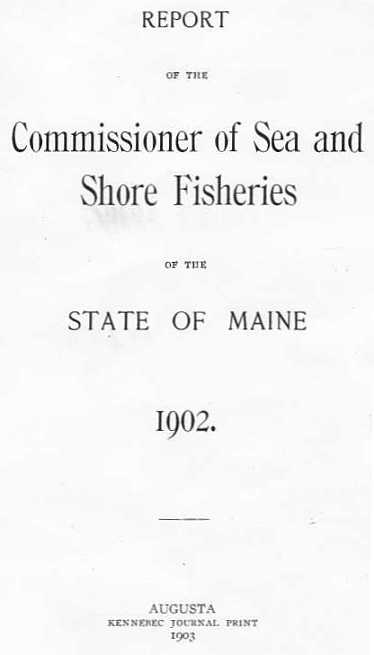 back
back
Report of the Commissioner of Sea and Shore Fisheries
of the State of Maine. 1901-1902
AUGUSTA
KENNEBEC JOURNAL PRINT
1903
------------------------------------------------------
CONTENTS.
Letter to Governor 8
Commissioner's Report. 9-11
Fish Wardens, list of. 68
Sardine Wardens, list of. 68
Inspectors of Pickled Fish, list of. 69
Alewife Fishery. 49
Clam & Scallop Fishery. 40-45
Ground Fishery. 54-57
Herring Fishery. 12-19
Lobster. 21-38
Mackerel Fishery. 57-58
Menhaden Fishery. 38-39
Salmon Fishery. 60-61
Shad Fishery. 59
Smelt Fishery. 45-48
Sardines. 20
Fisheries, grand summary of yield and production, 1902. 63
Fisheries, grand summary of vessels, boats and apparatus, 1902.
63
Summary of Investments, 1902, Table. 64
Summary of Investments, 1901, Table. 65
Persons employed, 1901, Table. 66
Persons employed, 1902, Table. 67
---------------------------------------------------------------------
State of Maine
Sea and Shore Fisheries,
Boothbay Harbor, ME
December 31, 1902.
To His Excellency, John F. Hill, Governor of Maine:
SIR: I have the honor to present herewith, as required by law,
the biennial report of this department for the two years
ending November 30, 1902.
Respectfully,
ALONZO R. NICKERSON, Commissioner.
-------------------------------------------------------------------------------------------------------------
9 Maine Sea and Shore Fisheries 1901-1902.
REPORT.
The fisheries are in a healthy condition and show a general improvement over previous years.
I believe all branches of the fisheries are more intelligently conducted than heretofore, and that the individual fisherman is better qualified to carry on the business and perform the work connected with its successful operation, and that as a consequence the fisheries of all kinds are more profitably conducted - both for the owner and dependent and independent fisherman - than ever before.
The usual tables are presented for the convenience of those interested in comparative statistics, and the general tables for both years will show in pounds in each case, fish, or fish product, the yield of the fisheries by species, and fishery, the totals in each, and the grand totals.
In making up this table this explanation is necessary:
Barrels of fish of all kinds are reckoned at 200 pounds.
Box herring at 5 pounds.
Bloaters, 40 pounds per box.
Oil, 7 1/2 pounds per gallon.
Scallops and clams, 12 pounds per gallon.
Clams, 10 pounds meats to the bushel in shell.
Clams, canned, 50 pounds per case.
Alewives, 1/2 pound each.
Lobsters. 1 3/4 pounds each.
There were 427 vessels of a tonnage of 8,259 tons, and 58 steam and sailing smacks in the several fisheries and lobster transportation in the year 1901, and 438 vessels of 8,114 tons, and 73 steam and sailing smacks during the year 1902.
These vessels having been engaged in several branches of the fisheries are not tabulated in any fishery, but are to be properly found in the grand summary tables of investment, numbers 19 and 20.
-------------------------------------------------------------------------------------------------------------
10 Maine Sea and Shore Fisheries 1901-1902.
The apparatus and appliances used in the fisheries are constantly increasing, the total value of same in 1901, being $2,790,234, and in 1902, $2,864,040.
In the year 1902 these vessels and this machinery for the capture of the fish were manned and operated by no less than 19,617 men, through whose efforts, as appears by the grand summary tables of yield, a magnificent catch and production of the total value of $3,319,424 were landed. All the catch being reduced to weight, as before explained, the total catch for the year 1901 was almost 185,000,000 pounds.
The lobster fishery is very much the largest in value of any single fishery, the total in 1902 being $1,226,561.
In the year 1901 there were 2,788 men engaged in lobster fishing, attending to 171,770 traps, averaging to each man engaged 61 traps. In the same year this number of men caught 7,790,265 lobsters, averaging to each man a catch of 2,874, while in the year 1902, 2,541 men engaged in this fishery with 167,045 traps, averaging 65 traps to a man, caught 8,185,342 lobsters, which averaged 3,321 lobsters to each fisherman.
While so many people claim the lobster is on the decrease in our State, statistics for the past four years will not bear out this statement, as will be readily seen by the following figures:
In 1899 (according to the report for that year) there were in use in the State, traps to the number of 186,724, which caught 7,267,506 lobsters. In 1900 from the same report 185,766 traps caught 8,232,115. In 1901 , 171,770 traps caught 7,990,265 lobsters. In 1902, 167,045 traps caught 8,185,342 lobsters, which gives all average yield to each trap as follows : 1899, 38 ; 1900, 44; 1901, 46, 1902, 48.
Knox county is considerably ahead of any other county in the lobster fishery.
As second in value the ground fishery in 1902 produced 46,278,946 pounds of fish worth $992,028, oil worth over $26,000, and tongues and sounds worth over $13,000. One thousand nine hundred sixty-three men were thus engaged. Knox county again comes to the front in this fishery, while Cumberland is second and York third.
Next in value to the groundfishery comes the herring. In 1901 the catch was 111,684,800 pounds, and the value was $740,743. One thousand nine hundred fifty-seven men were employed
-------------------------------------------------------------------------------------------------------------
11 Maine Sea and Shore Fisheries 1901-1902.
in this fishery. Washington county leads with two-thirds of the production and value of the whole State in this fishery.
The clam fishery next comes forward with a yield of 7,6I7,480 pounds, of a total value of $332,682. One thousand six hundred fifty-five men produced this result. Cumberland county makes report of largest catch and value, and the special table will show the importance of this business to our fishermen.
In the smelt fishery in 1902, 1,001,762 pounds were marketed and returned the 753 men engaged $95,833. Although the number of persons employed was less by one hundred than in 1901, the average to each fisherman engaged was $129.
Each fishery is fully shown in the appropriate tables under its title, and these figures are well worth a perusal of all interested in the development of a department and industry which needs the care and protection of the State, employs and engages a great many people, gives them a living, and responds most quickly to a liberal hand.
Early in the season of 1902 the wardens were requested by me to send a letter to this department at the close of the season (if they cared to do so) giving their views upon the fisheries, and suggesting any change in the present laws which they might think necessary, and were informed that perhaps the whole of no one letter would be published in this report on account of lack of room, therefore if some part of the different letters are not quoted I trust they will understand the omission is for the above reason.
Under each fishery I shall quote from these letters what the different wardens say.
-------------------------------------------------------------------------------------------------------------
12 Maine Sea and Shore Fisheries 1901-1902.
THE HERRING FISHERY.
This continues to be one of the most important industries in our State. Many hundreds of people are directly and indirectly engaged in catching with nets, seines and weirs, and transporting, packing, pickling and smoking.
The canning of sardines gives employment to a greater number of men, women, and children than any other branch of the fisheries. It is safe to say that for the 2,576,070 cases of sardines packed in this State for the two years last past that 90 cents per case has been expended for the one item of labor, which means $2,318,463 distributed among a class of people needing the money, and who pass it along to the great advantage to the business community in which they reside.
The towns near by these industries are found to be in a thriving and prosperous condition. There continues to be a good demand for herring for bait from our own State of Maine vessels and also from vessels from other ports. Cold storage plants are filled with this bait fish, to be supplied at times when herring are not available from the water.
This fishery, as well as others, will be injured seriously by the adoption of the Hay-Bond treaty now before the U. S. senate for ratification.
While our vessels seek Newfoundland ports only when they cannot procure bait in our own or Nova Scotian ports, on the other hand it will allow the merchants of Newfoundland to send fish products here in their own vessels, which means herring as well as codfish, thereby driving our vessels which go after herring during the winter months out of the business entirely, for we cannot compete with them in fitting and furnishing vessels. At the present time there are more than fifty American vessels on the way to and from Newfoundland for cargoes of frozen and salted herring. Eight vessels of the fifty are owned in our State of Maine. The herring are purchased of the Newfoundland fishermen and brought to Bucksport, Boothbay Harbor, Gloucester, Boston, New York, and Philadelphia for food. Those which are frozen are sold fresh, and those which are salted are mostly smoked for bloaters and sold all over this country.
-------------------------------------------------------------------------------------------------------------
13 Maine Sea and Shore Fisheries 1901-1902.
It is to be hoped that our senators in Congress will be able to defeat the ratification of this treaty, which, if it becomes effective will strike a crushing blow to both Maine and New England fisheries.
While we have such able men as now make up the delegation from Maine at Washington, little fear is entertained that it will be ratified if hard work on their part will accomplish anything. I would recommend that their constituents show their interest in the matter by some form of vigorous expressions of dissent from the treaty.
Maine cannot afford to give up any of its present fish markets to Newfoundland for the very little that is offered in return.
There are different opinions in regard to the length of the season for packing sardines. Some say "Commence late in the spring and run later in the fall." My opinion would be to allow the packing the year through. If the fish are with us in December, January, February, March and April, pack them if the packers can make it profitable to do so. I think the close time was asked for, more in the interest of the packers than it was to conserve the supply of fish. Years of an over-pack, thereby producing a glut in the market, was one of the reasons for the asking for a close time.
Warden Alfred Small of Lubec goes at length into a criticism of the canning law in a letter from which I quote as follows :
"As one of your wardens I can truthfully say that the past season has been a very trying one indeed. I presume your different wardens, as well as myself, have been obliged to use their own judgment in many cases the past season in regard to the quality of fish arriving at the different plants for canning. Could I have felt that the law would have borne me out quantities of fish that have been canned would have found their way to the fertilizer. No one canning factory has been to blame, but all are equally guilty in this respect and most assuredly goods have been put up that should not have been. I think a law should be passed giving the wardens positive instructions in this matter, and the penalty attached a severe one. At the opening of the season when the fish were of suitable size there was no difficulty in the packing six or more fish to a can, but as the season advanced the fish increased in size and a daily struggle commenced between the wardens and the packers for the required number of fish for the can. Five decent fish and
-------------------------------------------------------------------------------------------------------------
14 Maine Sea and Shore Fisheries 1901-1902.
a broken one were made to do duty. The law should be amended in this respect and either allow five good fish to a can instead of five and a tail.
"Every packer has been anxious to pack as many 1/4 oils as possible, and the fish have been cut back by fish hands and after passing through the oven have been broken by the packers so that a mass of broken fish has been the result. Not a very dainty morsel of food to say the least after they have been passed through the bath. The breaking of fish should be strictly prohibited.
"The snipping of fish has been attempted as I wrote you, and the steaming process I found myself unable to cope with. Those having ovens have begged me to allow them to 'snip,' but in every case they were told that they would be held strictly to the law. This also should be amended, for if not factories will be fitted with steam appliances and the same fish on which we depend for a supply of large (later) will be a thing of the past. I would amend the law by having it read 'Whoever bakes, fries, steams, or in any other manner packs sardines, etc.,' and make the penalty a severe one in every case.
"Sardine packers are by no means angels of light, and as long as quantity and not quality is the aim, a system of cheating will be carried on which commences in the cutting shed and is carried through every department until the cases are ready for shipment. In the flaking rooms the wardens find difficulty at times to get the work done in a suitable manner, but the wardens are helpless.
"The mending of leaks is another thing that should receive attention, as the factories have a system of 'quashing' the cans, and in many instances are not re-filled with oil or re-bathed. Should an attempt be made to call one packer to account the same would be true of all, as all are equally guilty.
"The ten or more factories under my supervision, scattered over quite a section, have been my daily care since the 15th day of May, and not anything has been done beyond my personal knowledge; yet I have not been entirely satisfied with the season's work, but have tried my best to carry out my instructions."
Warden Joseph Hamilton of Pembroke writes:
"I think that there should be something done to prevent the destruction of the small fish called brit, as there are thousands of tons of them spread on the land every year. If they were left in the sea they would make good 1/4 oils in another season.
-------------------------------------------------------------------------------------------------------------
15 Maine Sea and Shore Fisheries 1901-1902. The present season has been the worst in my experience to obtain a suitable fish for canning, owing largely I think to the destruction of the small fish.
"I think there should be a law requiring every owner of a weir to have a gate, or opening, to allow the small fish to go to sea, which would, I think, be a great benefit to the packers of sardines. I find that the packers are all of that opinion."
Under this head Warden W. W. Blood of Milbridge says: "The law in Narraguagus Bay and other waters for the protection of spawn herring should have the western limit closed up by having a line from some part of Petit Manan point to the light house."
Warden N. J. Hanna of New Harbor says as to this fishery: "A vast business has come to our State through the herring fisheries. Many hundred men are employed on land and sea, and many women and children are given employment in our sardine factories packing these fish, while an enormous business is conducted with the net and twine factories, in the purchase of materials for seines and for constructing the many weirs on our coast, which cost from four to eight hundred dollars each. With this enormous outlay in this one branch of our fisheries consisting of factories, steamboats, seines, and much other material, we think the law should be changed so as the greatest possible results might be acquired from the best outlay of capital.
The present law prohibits the taking of herring in all of the rivers and bays from Kittery Point to the west shore of the Penobscot River by drag or purse seines inside of certain lines drawn from shore to shore, thereby cutting out large bays and rivers where for weeks during the summer months these fish lay in large bodies unmolested. The law has said hands off, while our factories are laying idle for lack of material to work with. Then again, the law is so passed that most all bays, harbors, inlets, and rivers to the east of the west shore of the Penobscot River less than three miles across its mouth from mainland to mainland are prohibited to the use of purse and drag seines.
"It is said that these fish are migratory. If so, I would recommend the repeal of this law as far as the herring fisheries are concerned, and give to our herring fishermen absolute freedom of our bays and rivers.
-------------------------------------------------------------------------------------------------------------
16 Maine Sea and Shore Fisheries 1901-1902.
"I would also recommend the extension of the packing season through the month of December for this reason, viz. - that for the past five years it has been a noticeable fact that the herring have first struck in on the eastern border of the State and the packing season in that section has been, or nearly so, in August and September, and for the past three years by the time the herring school has got as far west as Lincoln county the packing season was about over. And again not until the last of October does the herring leave the forbidden fields, or until the water becomes chilled, then they are in better condition to pack in the month of December than any other month.
"As the law stands in regard to sardine packing we are beaten three ways, viz.\ : We are beaten by the early catch on the eastern part of our State, we are beaten by being cut out of much valuable fishing ground, we are beaten by not being allowed to pack through the month of December when fish are plentiful."
Herring tables for 1901 and 1902 follow - Numbers 1 and 2.
The sardine industry is also shown in tabulated form in Numbers 3 and 4.
-------------------------------------------------------------------------------------------------------------
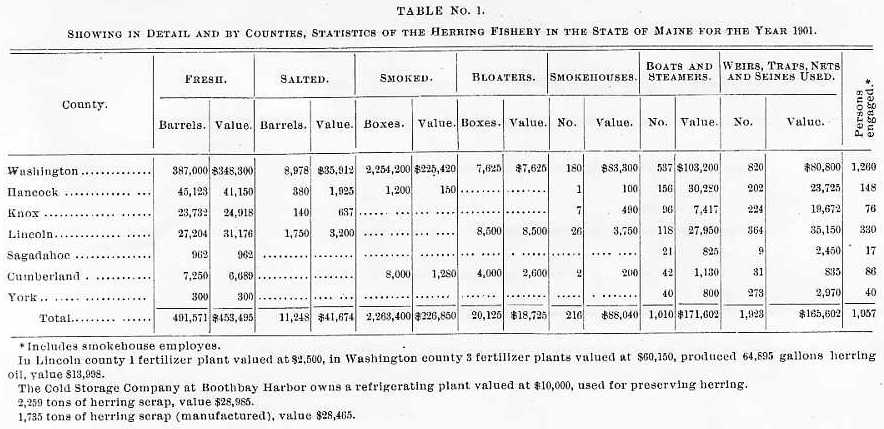
-------------------------------------------------------------------------------------------------------------
18 Maine Sea and Shore Fisheries 1901-1902.
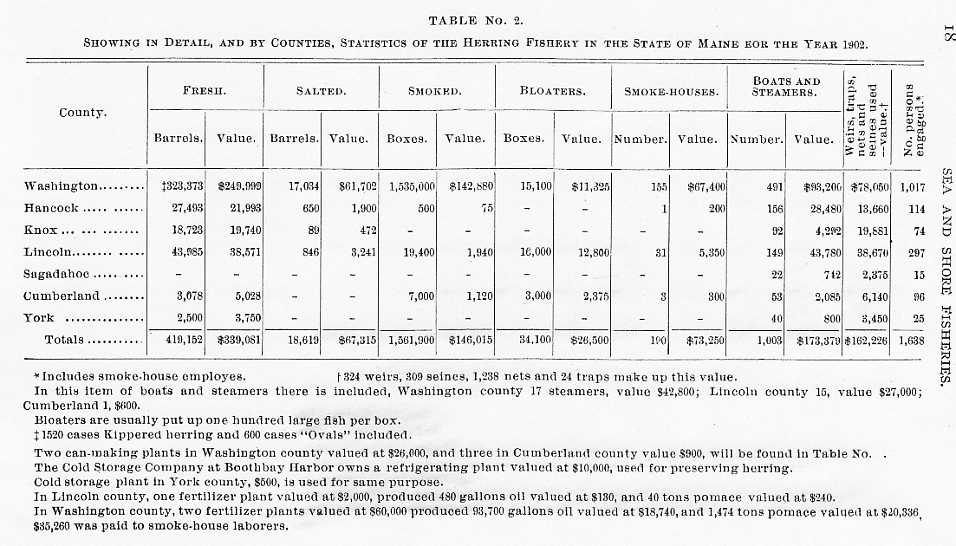
-------------------------------------------------------------------------------------------------------------
19 Maine Sea and Shore Fisheries 1901-1902.
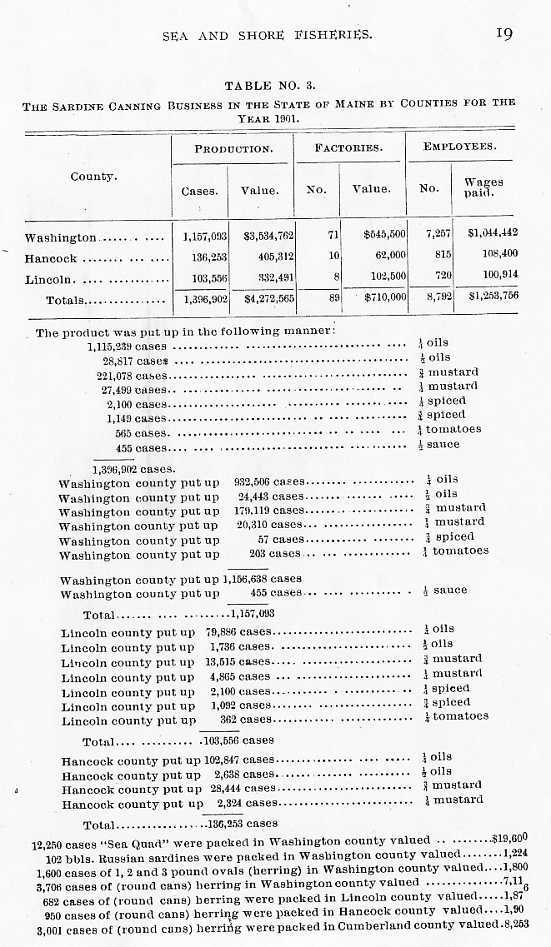
-------------------------------------------------------------------------------------------------------------
20 Maine Sea and Shore Fisheries 1901-1902.
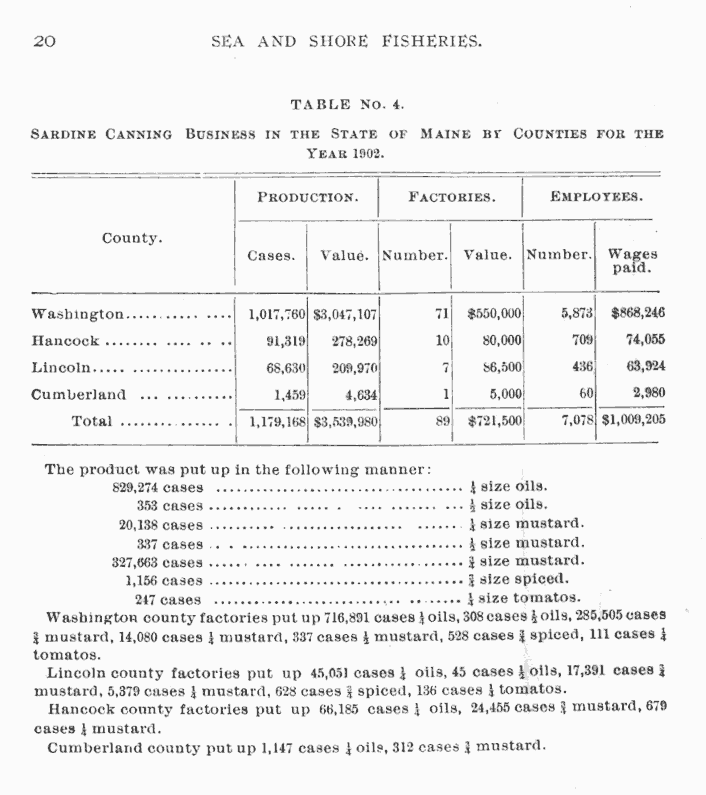
-------------------------------------------------------------------------------------------------------------
21 Maine Sea and Shore Fisheries 1901-1902.
THE LOBSTER FISHERY.
No fishery in the State can show better results than this, and no state in our Union can compare with our own in this branch of the fishery, and I think that no state can ever equal us in this business, providing the 10 1/2-inch law is retained and observed.
I cannot say that the present law is not violated or that it has no detractors, but it is generally observed, and in some localities where the business is the most prosperous and successful, an intentional violation of its provision is seldom known.
I wish to say that I think the fishermen are not so much to be blamed for the violations of the law as the people at large. If there were no purchasers for the illegal short lobster there would be no object for the fishermen's taking them from the traps and keeping them, instead of liberating them as required by law. If the people - the buying public - would consider the question and think what it means to this State and to the poor fishermen,- there would be few customers asking for short lobsters, and few men or women who would sympathize with those who violate the law for their intended profit.
When we stop to consider we will see that one hundred 10 1/4-inch lobsters sold in July, which bring the fishermen from three to six dollars, if sold in August or September of the same year (when the lobster has moulted and taken a new shell and gained one-fourth of an inch in length and become a legal lobster) will bring from twelve to twenty dollars.
Instead of assisting the violators, in about every case the people might assist the State in prosecuting, and thereby benefit the honest fishermen, and instead of helping to make criminals would be making law-abiding citizens. At the same time fishermen that now make a business of handling short lobsters will have received more money for their season's work by complying with the law.
During the five years that I have served as Commissioner there has been one instance where a person has come to me and
-------------------------------------------------------------------------------------------------------------
22 Maine Sea and Shore Fisheries 1901-1902
said "Go on and prosecute the violators. I will stand by you, and if necessary contribute my money to that end." In this same period of time I can call to mind hundreds of cases where the violators have been told they might have assistance with influence and money to fight the State.
A law with which the people are not in sympathy is hard to enforce, whether it is a law prohibiting the sale of certain fish or intoxicating liquors.
In my last report I said: "The law as to the legal length of lobsters - 10 1/2 inches - should remain as it is. I do not believe that making the limit less than 10 1/2 inches would be any advantage. I think the law is generally working well, and when strictly observed is the best for the fishermen and the State that can be at present devised." As I said then, I shall recommend a change in the law which will affect the sale of "picked out meat," and a slight change in that part which relates to the seizure and sale.
The United States Fish Commission will, I am informed by the department, erect its hatchery at Boothbay Harbor early in the season of 1903, which I trust will assist in keeping up our supply.
Following the custom of the past few years the United States Fish Commission has taken under permit from this department from the Maine coast waters, during the two years last past, 5,543 egg-bearing lobsters for the purpose of securing the eggs for artificial propagation.
The following report and statement from the Gloucester, Mass., Station will give detailed information of these highly important experiments in scientific fish culture for 1901 and 1902.
-------------------------------------------------------------------------------------------------------------
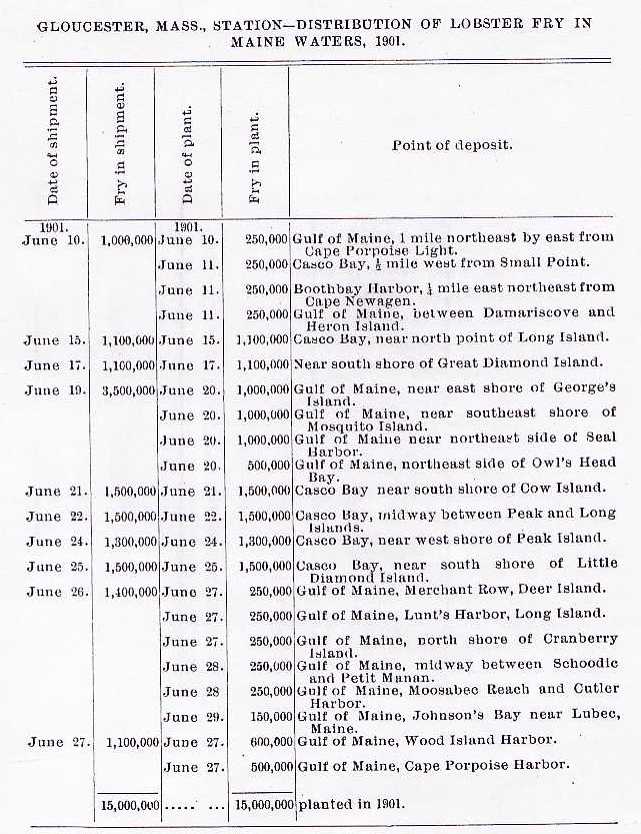
-------------------------------------------------------------------------------------------------------------
24 Maine Sea and Shore Fisheries 1901-1902.
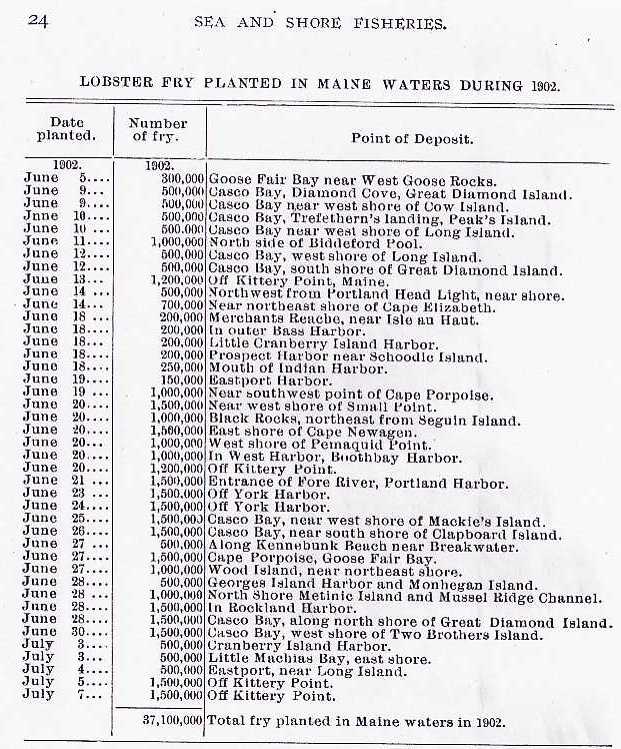
LOBSTER FRY PLANTED IN MAINE WATERS DURING 1902.
Date planted Number of fry Point of Deposit.
1902
June 5. 300,000 Goose Fair Bay near West Goose Rocks.
June 9 500,000 Casco Bay, Diamond Cove, Great Diamond Island.
June 9 500,000 Casco Bay near west shore of Cow Island.
June 10 500,000 Casco Bay, Trefethern's landing, Peak's Island.
June 10 500.000 Casco Bay near west shore of Long Island.
June 11 1,000,000 North side of Biddeford Pool.
June 12 500,000 Casco Bay, west shore of Long Island.
June 12 500,000 Casco Bay, south shore of Great Diamond Island.
June 13 1,200,000 off Kittery Point, Maine.
June 14 500,000 Northwest from Portland Head Light, near shore.
June 14 700,000 Near northeast shore of Cape Elizabeth.
June 18 200,000 Merchants Reach, near Isle au Haut.
June 18 200,000 In outer Bass Harbor.
June 18 200,000 Little Cranberry Island Harbor.
June 18 200,000 Prospect Harbor near Schoodic Island.
June 18 250,000 Mouth of Indian Harbor.
June 19 150,000 Eastport Harbor.
June 19 1,000,000 Near southwest point of Cape Porpoise.
June 20 1,500,000 Near west shore of Small Point.
June 20.... 1,000,000 Black Rocks, northeast from Seguin Island.
June 20.... 1,600,000 East shore of Cape Newagen
June 20... 1,000,000 West shore of Pemaquid Point
June 20 .... 1,000,000 In West Harbor, Booth bay Harbor
June 20 1,200,000 Off Kittery Point
June 21 1,500,000 Entrance of Fore River, Portland Harbor.
June 23 ... 1,500.000 Off York Harbor.
June 24 1,500,000 Off York Harbor.
June 25 .... 1,500,000 Casco Bay, near west shore of Mackie's Island.
June 26.... 1,500,000 Casco Bay, near south shore of Clapboard Island.
June 27 ... 500,000 Along Kennebunk Beach near Breakwater.
June 27... 1,500,000. Cape Porpoise, Goose Fair Bay.
June 27 1,000,000 Wood Island, near northeast shore
June 28 .... 500,000 Georges Island Harbor and Monhegan Island.
June 28 ... 1,000,000 North Shore Metinic Island and Mussel Ridge Channel.
June 28.... 1,500,000 In Rockland Harbor.
June 28.... 1,500,000 Casco Bay, along north shore of Great Diamond Island.
June 30.... 1,500,000 Casco Bay, west shore of Two Brothers Island.
July 3 .... 500,000 Little Machias Bay, east shore.
July 3 ... 500,000 Cranberry Island Harbor.
July 4 .... 500,000 Eastport, near Long Island.
July 5 .... 1,500,000 Off Kittery Point.
July 7 ... 1,500,000 Off Kittery Point.
37,100,000 Total fry planted in Maine waters in 1902.
Warden Hanna says : "The mother, or egg-lobster, has no protection under our present law; (although the law prohibits) the eggs are removed by fishermen with a brush, then they can safely put them in a car and sell.
"The pound owners are not allowed to put egg-lobsters into their pounds, but after impounded four months there will be from one to three thousand lobsters that will be seed bearing - they are taken out and sold, and I ask where is the protection for the goose that lays the golden egg?
My remedy for this evil is this, that the owners of every pound shall be compelled to keep not less than 2,000 egg lobsters the year around for breeding purposes. The investment would be only, about $200. They have discovered that 23 per cent
-------------------------------------------------------------------------------------------------------------
25 Maine Sea and Shore Fisheries 1901-1902.
of all lobsters impounded die inside the pounds, and what argument can they use against the request to keep seed lobsters as a source of propagation ? With twenty-three lobster pounds on the coast of Maine, each with 2,000 seed lobsters, it would give 46,000 egg lobsters, continuously seeding the coast of Maine. It would far surpass any artificial methods that have ever been brought out by men."'
The 10 1/2-inch law has no very material defects, but there is grave need of amendments to that law. For the first three years there was but one method used to violate this law - to hide them (short lobsters). Soon a new method of attack was sought. It was discovered that the meat taken from the shell of a 10 1/2-inch lobster could not be detected from the meat taken from a legal lobster, and it was also discovered that the law was silent on the "meat" question. This new method of violation had its origin in Casco Bay. They were looking for cheap lobsters, and successfully punctured the law by cooking their little lobsters on the islands of the bay, picking out the meat and shipping it in large quantities to market. The method has not spread much beyond this locality.
The dealers in Portland find fault because this small lobster meat runs against their business, ruins their local trade. The fishermen know if the hotels and cottages were not supplied with unlawful meat that they would maintain better prices, and that they would be able to supply legal lobsters.
Cumberland county with her 875 lobster fishermen, almost double any other county, and with her large lobster territory, makes the smallest showing of any county in the State. Little Lincoln county with 500 fishermen produced in 1899, 1,565,131 legal fish against Cumberland county 496,650 with 849 men ; Hancock county with 465 men landed 2,122,110 legal fish.
Where the largest amount of violations exist, the smallest number of legal lobsters are taken. Other counties have shown a steady, increase. Cumberland has grown less. There are fears that this will spread and destroy the good results achieved by this law.
I would recommend that wardens be empowered to seize all lobster meat in transit, and that the owner be given twenty-four hours to prove before a magistrate that the meat was taken from the shell of legal fish.
-------------------------------------------------------------------------------------------------------------
26 Maine Sea and Shore Fisheries 1901-1902.
There is a custom among offenders to shield each other, and to secrete their ill-gotten gains. I would amend the law so that the party may be held for aiding and abetting a criminal in violating the law.
On the subject of close time, I have talked with fishermen on the subject all along the Maine coast during the year. They are about equally divided. Some claim that a close time of three months - from April 15 to September 15 - would effectually stop the violation by summer tourists, who feel they are privileged characters.
Again we have a class of weir fishermen that only lobster during the summer and fall months. They range from 55 to 65, are aged and unfit for the winter fishing and are content. The close time (as above) would destroy their privilege. A close time in the winter would be very pleasing to that class that live on the coast. River fishermen would be pleased. Then the smacks must lay idle, the dealers must close up, and pounds go unreplenished, and business transferred to Massachusetts. My opinion is decidedly against a close time. Amend by a good "meat" law, and compel owners of pounds to retain a certain number of seed fish in pounds.
This fishery should have more than a passing notice. It is worthy of protection. It is a home industry. As each year rolls around more men, more boats, more traps, are being added to the business. It is unlike any other fishing. There is no salting, no curing, no waiting for a market, no anxiety about a market. They are staple goods as gold from Klondike mines.
Prior to '95 we had many canning factories on our coast, whose only business was to can lobsters from April 15 to July 15 upwards of nine inches in length. The lobster business was almost annihilated. The can lobster filled almost every grocery store from the Pacific to the Atlantic. The people of the great West knew only canned lobster. Prior to '95 there had never been a live lobster shipped beyond the western border of New York state. Lobsters had become scarce on our coast owing to the constant drain upon the small lobsters for factories. One of the methods of destruction in the canning days was the habit of carrying from three to five inches lobsters before the close time was off, crowding from 3,000 to 5,000 into space not large enough for 2,000, and on the 15th of April when the factories
-------------------------------------------------------------------------------------------------------------
27 Maine Sea and Shore Fisheries 1901-1902.
could secure them, more than half of the small fish were dead. It is said that one million were lost in this way each spring. We had but five wardens then and they were very poorly paid to look after the business. I have only shown a part of the willful destruction under the old law to compare with what has been done under the law of '95, when factories practically went out of business, never to return, I hope.
The 10 and 1/2-inch law is the best for the protection of the young lobsters we have ever had. The fishermen claim that it is the salvation of the lobster industry, but it does not suit everyone - the violators or the summer tourists.
The business has increased since '95. The number of men has increased four-fold ; the traps and gear have increased; the prices received have increased; pounds from four in '95 to twenty-three in 1902. Steam smacks have taken the place of sailing smacks; rapid transit and refrigerator cars are carrying our lobsters all over our country. Each year the demand is greater, and the question is - Can we ever supply the demand? Answer - Yes. Good liberal appropriations, great care and attention will increase the supply of lobsters and all will be benefited thereby.
Warden W. W. Blood states his position upon the present lobster law in the following language "I have never been in favor of the present lobster law as it now stands. It is my opinion it would be far better to catch the medium lobster, between nine and twelve inches, or what length could be decided on. I do not think the law obtains the results for which it was intended - to protect and increase the lobster.
"To free all lobsters above twelve inches and below nine would, in my opinion, tend to protect and increase them. Above twelve inches would save so many spawn fish for breeding; those below nine are rather small to catch and make use of. There is no question but that many fishermen destroy the spawn and save the lobster, which, if the fish above twelve inches were illegal, they can have no object to do so.
"I do not think it would decrease. It would rather increase their catch. In my opinion something of this kind will be done sooner or later. Local close time will not do it. Perhaps general close time may help some.
-------------------------------------------------------------------------------------------------------------
28 Maine Sea and Shore Fisheries 1901-1902.
"Could there be some arrangement made with pound owners to collect and keep for breeding all spawn fish they could obtain, it would, in my opinion, tend to increase them ; the young fish would be protected by being in the bays and rivers, shoal water, and eel grass, and not disturbed and destroyed by the other kinds of fish, as cod, hake, haddock, pollock, as perhaps the fry from United States Commission boats are, being disposed of at sea.
"I don't believe in local close time on fish of any kind in sea water. They should be, general.
"Local laws are more or less discriminating and cause a lot of trouble between fishermen. As near as possible they should all share and share alike in all waters. Weirs should not monopolize more waters than they enclose - the weir laws ruin lobster fishing, are unjust, and the fine excessive. If they are to have protected waters, owners of weirs should have notices on the weirs, also perches around these waters that the lobster fishermen may know when they are outside the limit. Should the weir owners fail to have such notices and perches then they deserve no benefit from the law.
As it now stands the wardens have the laboring oar, as they are obliged to measure all the distances from the weirs. Lobster cars should have the name of all who occupy them, or any part of them, as well as the owner, or owners, or be liable to the same fine.
"There should be a fine on all lobster traps found in the waters of Pigeon Hill Bay during close time, between the first of July and the first of September.
"There is so much to write, or so much could be written about this question of fish, that I will leave to someone else the many perplexing questions, pro and con."
Warden D. O. French of Jonesport suggests :
"A close time on lobsters from August 1 to October 1 of each year. My reason for making this suggestion is that there are so many lobsters destroyed in the above months getting them to market. The shipments of lobsters have not decreased any from this town (Jonesport) in the past two years."
Warden William Hale of Bangor advises :
"That in regard to the lobsters I think there are a great many short lobsters killed at the summer resorts which help to destroy the propagation of them, and it is my candid opinion that there should be more protection at such places."
-------------------------------------------------------------------------------------------------------------
29 Maine Sea and Shore Fisheries 1901-1902.
Warden J. F. Goldthwaite of Biddeford recommends as to the lobster fishery laws as follows :
"It has been wisely said by you that the State of Maine is the great fishing ground for lobsters, and feeling that the country must depend largely upon our State for its supply in the future, it looks to me as though our supply will soon run short unless we take good care and well protect them by wise laws that have sharp teeth in them, as laws without such teeth do but little good. And here I would have every one that fished for, bought, or sold, or transported from place to place, or to a team, railroad or express company, file their true names with the Commissioner of Maine Sea and Shore Fisheries 1901-1902, or one of the wardens, and then have the wardens in each county file a list of names of all persons that have delivered lobsters to the express companies and railroads in his locality that are near tide-water, the company to receive only from men whose names have been filed.
"Then I would have a heavy penalty for using any fisherman's name in any way about the catching or shipping. You see the way it is now a man fills his barrels with lobsters - short or long - puts any name on he has a mind to, leaves it at a landing, and the express or any team goes and takes it and the charge is collected at the other end of the road, and so you can't find out who the real shipper is. This is the way a large part of the lobsters are shipped now. I would have the team or express take the lobsters direct from the shipper, and the local buyer direct from the fishermen.
"I should have all traps, pots, or anything used to catch lobsters, made with an open space all the way round next to the bottom long enough to let any lobster under the legal length to go through, and have all traps inspected by the wardens before they are put into the water; and any pot not so made found in the water, cut the buoy off and let it go, and I would have a heavy penalty for the violation of any of these laws.
"Every man that fishes from Cape Elizabeth to Kittery Point (that is what ground I cover, as you know) wants a close time, and I think myself that a close time of five or six weeks each year would be best for all in the end.
"To section 21 I should add after 'liberated,' a line as follows: `When taken from the trap.' As you know, Judge Peters ruled at Wiscasset that was the intent of the law, and in section 24 I should strike out all after 'disposed of and add the words,
-------------------------------------------------------------------------------------------------------------
30 Maine Sea and Shore Fisheries 1901-1902.
"by the wardens," so as to do away with expense of officers and libels, which in most cases cost much more than the lobsters sell for.
"In section 26 I would add, after 'so marked' the words, 'all buoys not so marked shall be cut from the trap and turned adrift.' This will also save expense of libels, and in section 29 I should have the sale without appraisals or libels also."
Warden Abner C. Johnson of Ashdale, evidently satisfied with the law, is interested in the lobster question, for he says:
"There is really only one matter I am interested in and that is the lobster law, which I believe is one of the best laws that can be enacted for the benefit of the community, and more especially for the lobster fishermen.
"There is one thing, the penalty is not severe enough, for the law-breakers do not fear the law as it is at present.
"I know that the present law has been a great benefit to most of the fishermen in this county, but in Cumberland county where they have been mutilating them and selling the picked-out meats it has not been a benefit, as in places where they do not such a business.
"I only hope there will be a law enacted to stop the sale of picked out meats, and give the wardens a right to inspect all such contraband goods.
"There should be a law made to stop handling lobsters less than 10 1/2 inches, alive or dead, cooked or uncooked."
Warden Richard Orr of Orr's Island states at length his views as to certain phases of the lobster situation:
"I think there might be some changes made in the sea and shore fishery laws that would greatly help to increase certain kinds of fish along our shores, especially the lobster fishery, which to my mind is of the most importance, and something should be done at once to protect this industry. Now I believe first we want a law to prohibit the boiling and picking out of short lobsters less than 10 1/2 inches, or in other words stop the sale of lobster meats, and until some such a law is passed we never can expect to increase lobsters.
"I have talked with a number of the lobster dealers in Portland and they tell me that this shipping of the meat through the country is taking away their boiled lobster trade. Where two years ago they were shipping thousands of pounds weekly,
-------------------------------------------------------------------------------------------------------------
31 Maine Sea and Shore Fisheries 1901-1902.
now if they get orders for two or three hundred pounds they are doing well.
"I believe there should be inspectors under the present law, men who have had experience in the lobster business, and have the meat examined by them wherever it is found, and when from small lobsters of illegal length said meat to be sold for the benefit of the State.
"I expect a law, or trying to get such a law to stop sale of lobster meats, would meet great opposition on account of the summer visitors coming to our shores - people claiming large lobsters too costly to use in the business of keeping boarders.
But I believe one should look out for the poor as well as the rich, and I trust you will use your influence in trying to get a law different from the present. We want a law to give the wardens power with a warrant to search a dwelling house by day or night for illegal fish. It wants to be in plain language so there can be no doubt about it as there is to-day. There should be a bounty paid by the State for egg lobsters caught. Let the wardens mark them and liberate them in some good place where they can hatch their young and take care of them according to nature, or else turn them over to the State, or United States hatchery, and when the young shall have arrived to that stage or size where they can look out for themselves, have them returned to our shores near where they were taken.
"There should be a law that no lobster trap while in use catching lobsters should have the laths upon it less than two inches apart, and no trap - while fishing - should be covered with any netting, so all small lobsters might have a chance to crawl out, as under the present law they lath their traps or put the laths so near together, and some put netting over them, so nothing can get out.
"I believe a good thing under the present law would be a small steam or naphtha boat, something that would accommodate about three wardens besides engineer, and have a tender with them so that they could land at any place the fishermen did. I believe more lobsters could be saved and more illegal fishermen caught by these four men than by all of the wardens along the coast."
Warden George E. Cushman gives expression to his views in the following quotation from his letter:
-------------------------------------------------------------------------------------------------------------
32 Maine Sea and Shore Fisheries 1901-1902.
"Now take the lobster law. There are certain clauses in our lobster law which make it very hard to enforce. The clause 'mutilated, uncooked lobster is prima facie evidence of their being short,' while mutilated cooked lobsters although short are all right. I have found in several instances mutilated cooked claws and tails of lobsters. If not less than the required length where were the bodies of these lobsters ?
"The lobster dealers may say it will hurt their business to make a law stopping the sale and transportation of lobster meat, but it should be done. What is the lobster meat that the dealers sell? It is nothing more or less than 'dead' lobster which they pick out of their cars every morning and boil and pick out the meat. Now this is no guessing, but something that I have seen for years. "Another way the dealers get rid of a good many dead lobsters is by selling them to the hawkers or peddlers, and they will take all they can get. In certain localities the fishermen will break the claws and tails from the bodies and throw the bodies away. At their homes someone will have the water hot and in a few minutes the claws and tails will be cooked, so the wardens cannot take them if they can get into their houses, which they can't do without a search warrant which is about impossible to get.
"Now the present 10 1/2-inch lobster law was presented to the Legislature and passed to benefit the fishermen of the State of Maine, and I talked with a good many before we had the present law and they said if we could have a 10 1/2-inch law they would be satisfied, but in some localities they don't seem to be satisfied. Would recommend a steam launch for the use of the department."
Warden S. P. Cousins, although not entirely off soundings, acknowledges that he is in pretty deep water on the lobster question. He says:
"I am taking in the usual amount of 'lobster probabilities,' but find such diversity of opinion as to what new law should be made, or old ones changed, that I have almost lost my bearings."
Warden Isaac H. Snow states in his letter: "I would have the lobster law changed so that wardens can take mutilated lobsters cooked as well as uncooked.
-------------------------------------------------------------------------------------------------------------
33 Maine Sea and Shore Fisheries 1901-1902.
"I would have fifty cents paid for every seed lobster delivered to wardens, and it should be the duty of the wardens to put such lobsters in the safest and best places.
"I would have a penalty of ten dollars imposed for hauling a lobster trap on Sunday, whether by owners or anybody else excepting wardens."
Warden Albert French says :
"As a change in the lobster law either have a close time for a number of years, or protect the large lobsters. That is, make diameter of the ring so small that a large large lobster cannot enter the pot. Change law so the large lobster will be protected. Let the small ones be taken. As it is now the small and large are taken despite the law, and the lobsters are fast disappearing. Large lobsters can be readily detected. The law should not allow any broken or mangled lobsters of any size to be sold, or allow any female lobster to be taken in any way for a period of years. Give the large lobster a chance. Diameter of ring is the important factor. As it is the large females are taken and their eggs scraped oft and thousands of lobsters destroyed. I would advise heavier penalties by fine and imprisonment."
Upon the all important "lobster" question Warden Peter M. Kane says, quoting from his letter, that : "It is a question of importance to all the citizens of the State, and especially those on the coast line, and there are great differences of opinion and it is hard to tell which is for the best. I do think that the lobster fishermen on the whole would receive a benefit if we could have a close time from the 1st of July to October1, as a great many of the lobsters taken during that time are soft shelled and unsuitable for market. I would suggest that our lobster fishermen in the State be required to take out a license or permit from the wardens in his section, with the approval of the Commissioner, the license having some form attached binding the fisherman to abide by the conditions of the permit by which he would agree to liberate alive all lobsters under legal size, and all seed lobsters unless otherwise instructed by the Commissioner of Sea and Shore Fisheries. I think that a law like this with a penalty and revoking of license unless the agreement was kept would have a tendency to preserve the law."
-------------------------------------------------------------------------------------------------------------
34 Maine Sea and Shore Fisheries 1901-1902.
Warden F. M. Trundy says:
"I haven't seen a lobster fisherman on my route but is satisfied with the lobster law the way it is now. I don't see where they could make any change for the better than it is now.
"I have less lobsters on my route this year than last year and more stock. A little over fifteen thousand more this year than last year."
Warden Frank L. Hodgdon put the lobster question from an ethical standpoint:
"I would say that the laws, as a rule, have been well observed. The lobster fishermen are nearly unanimous in their opinion that the present lobster law has been the means of preserving the lobster, and that without such law the fishery would be very much depleted. We believe that in the enforcement of the laws we should appeal to the good judgment of our fishermen, and thus seek to create a public sentiment in favor of a faithful observance of the same."
Warden George A. Dow gives his ideas upon the lobster law as follows :
1. - The law protecting the lobster fisheries should prohibit the sale of mutilated cooked as well as mutilated uncooked lobsters.
"2. - It should also prohibit the sale of lobster meat unless such meat has passed the inspection of a warden or of some person appointed for that purpose. I believe much of the lobster meat offered for sale is unfit to eat. It is taken from lobsters of illegal length, and packed while hot in wooden boxes, and frequently becomes tainted before it is put upon the market.
"3. - The State should pay the fishermen for all lobsters brought to market with seeds attached. I believe the seed lobster should be branded and not again captured or offered for sale until after shedding the branded shell. The more protection we can give the seed lobster the greater the success of propagation.
"4. - All lobster traps or pots used for catching lobsters should be so constructed that the slats will not be less than one and one-half inches apart, thus enabling the small lobsters to escape. As the majority of lobster traps and pots are now constructed the slats are placed so closely together that nothing can escape.
-------------------------------------------------------------------------------------------------------------
35 Maine Sea and Shore Fisheries 1901-1902.
"5. - All lobster fishermen should be licensed by the State through the Commissioner of Shore Fisheries, the expense of such license to be borne by the State. If a fisherman is caught disobeying the laws his license should be revoked for a certain length of time; this in addition to his fine."
Warden Charles E. Sherman of Boothbay Harbor in his letter says :
"I think if the State owned or chartered a steam or naphtha launch in which the Commissioner and his wardens could move along the coast it would be money well invested."
The Hon. George Malcolm, a high British American authority on scientific fish culture, some years ago very pertinently says:
"The advances recently made in the art of fish culture can hardly be described as less than marvelous."
Referring to the culture of marine food fishes, he adds : "It is still improbable that more than a small minority of the British public, at least, ever associated the ocean with the land as a field fitted and prepared for a great cultivation of food. And yet it really is so. When the creative fiat went forth, man was awarded dominion over the sea and all therein, just as much as over the land; but just as he must win the gains of the soil by the sweat of his brow, so must he reclaim the harvest of the sea by unceasing and intelligent methods of labor.
"All, or nearly all, the conditions and methods of land cultivation, have their analogues in the economic cultivation of the waters. The sounds and shoals and banks in the ocean are the great fish farms; the ocean-going fish craft are the necessary farm offices, and the various appliances of fish capture are the complements of our scientific implements of land husbandry
The following tables show the catch and value, apparatus and value, and number of persons employed for 1901 and 1902:
-------------------------------------------------------------------------------------------------------------
36 Maine Sea and Shore Fisheries 1901-1902.
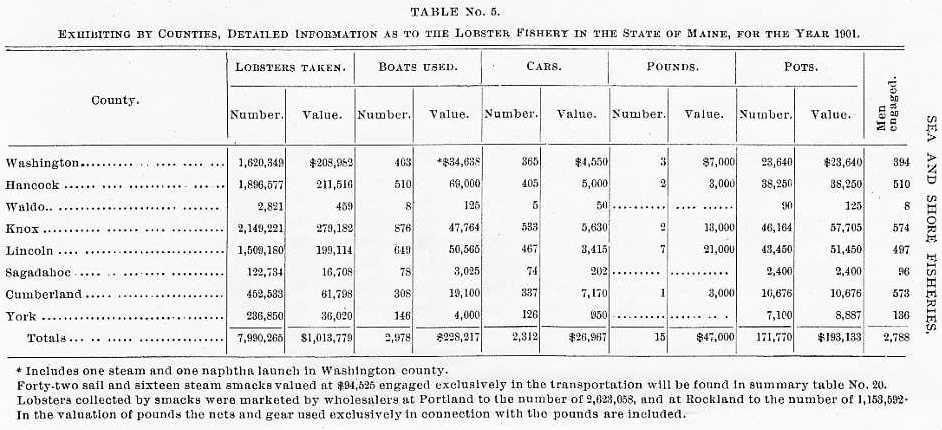
-------------------------------------------------------------------------------------------------------------
37 Maine Sea and Shore Fisheries 1901-1902.
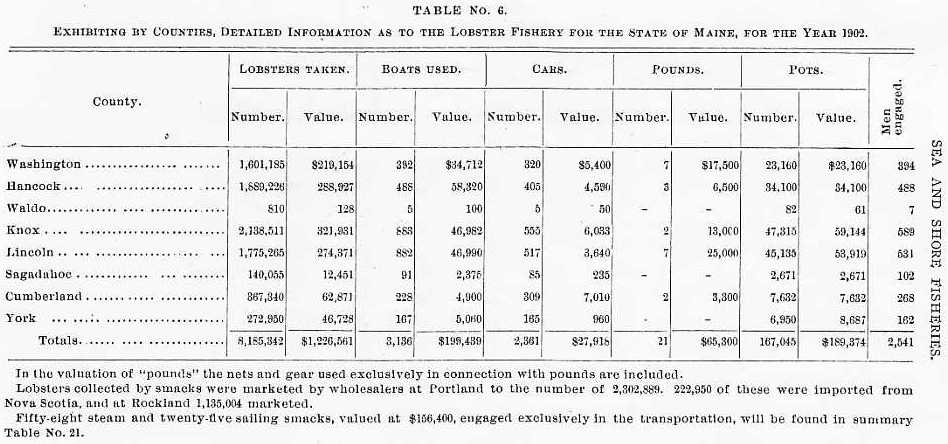
-------------------------------------------------------------------------------------------------------------
38 Maine Sea and Shore Fisheries 1901-1902.
THE MENHADEN INDUSTRY.
There has been no return of the menhaden schools to our coast, and consequently I am again compelled to report no business in our State in this important fishery either in 1901 or 1902.
While this discouraging report is made as to the State of Maine waters, I am gratified to state that in the southern grounds, south of Cape Cod, during the season of 1902 the schools of fish have been very large, and the catch has far exceeded in quantity and quality any other season. The Fisheries Company of New York, controlling the menhaden fishery of this country, has done a very prosperous business. While these remarks have reference to the year 1902, in the previous season of 1901 the fish were abundant, the catch large, and returns satisfactory.
Though we cannot report any fishing on our coast there are three factories in condition, and in the season, in readiness to take fish at short notice, and we hope the fish may come next season and a large and profitable catch made on our coast, to be utilized in our factories. These factories are located in Lincoln county, and a large amount of money is invested in the plants, which is shown in the general table.
For the information of many, who are in different ways interested in this one-time great fishery in our State, I am enabled through the courtesy of Mr. Church, general manager of the Fisheries Company, to present very interesting and quite full information and figures as to the menhaden fishery and manufactory for the present year, up to November 22, as per following letter and tables.
New York, December 6, 1902.
Mr. A. R. Nickerson, Boothbay Harbor, Maine.
DEAR SIR: I am in receipt of your favor of the 4th inst. and note your request for a report of our catches. I enclose you herewith copy of our last weekly report which gives you about all the information that you require. This does not contain the number of steamers, or their valuation, or men employed, but
-------------------------------------------------------------------------------------------------------------
39 Maine Sea and Shore Fisheries 1901-1902
I think if you will take a rough estimate on steamers which would amount to $250,000 to $300,000, and from 1,500 to 1,700 men employed on board and ashore ; about 700 men on the boats, I think.
Trusting these figures will give you the information desired, I remain,
Yours very truly,
N. B. CHURCH,
General Manager.
RESULTS OF FISHING TO NOVEMBER 22, 1902.
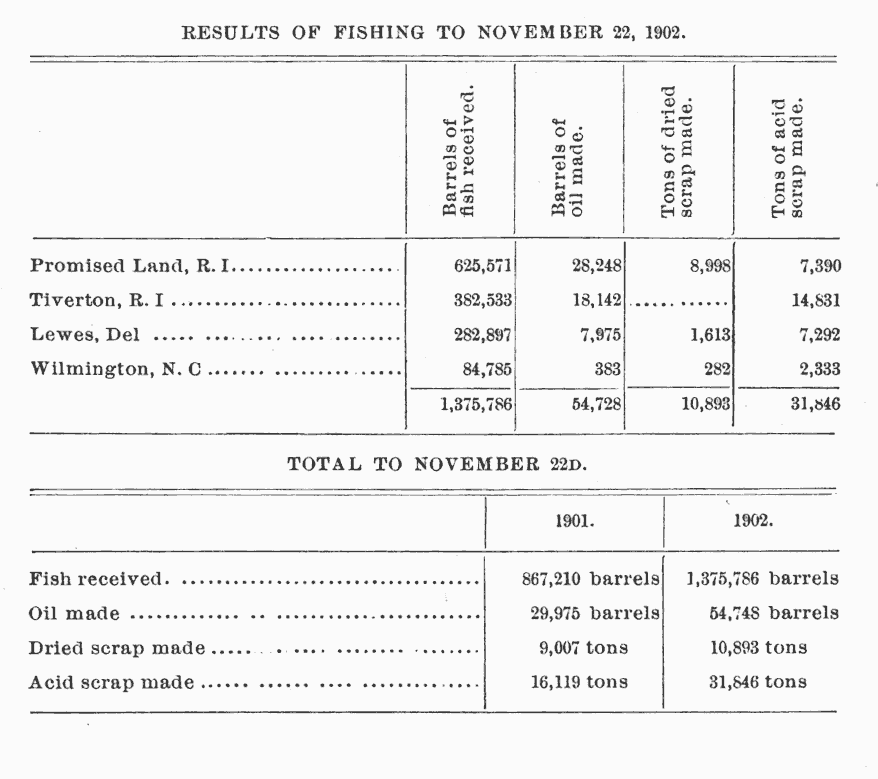
-------------------------------------------------------------------------------------------------------------
40 Maine Sea and Shore Fisheries 1901-1902
CLAMS AND SCALLOPS.
I am aware that the drain on our clam supply is very large and the demand for the Maine clam still increasing, and to conserve and increase the yield is the all important question. The clam fishery is one of the most important for reasons I have given in former reports.
Many suggestions and recommendations are proposed to increase the supply. What legislation to propose, if any, is a very serious matter. Many things that are proposed as remedial, corrective, and ultimately beneficial in increasing the yield and product, are impracticable on account of difficulty of enforcement and attendant expenses.
I quote below what the wardens from those sections of the State most interested have to report upon the subject.
While I don't believe in legislating one party out of business that another may thrive in the same, it may be some time necessary to stop the canning of clams by legal enactment.
Warden Hanna says : "A few years ago the clams along our coast had become so scarce by the enormous drains for canning and shipping purposes that a close time of three months was made, during which no clams should be shipped across the borders of the State. This law has greatly helped to replete our clam flats with fine, edible clams.
"It is said by scientists that a clam will grow to be a good sized edible clam in seven weeks, and our own experience on the growth of clams proves the statement to be true. This close time was a step in the right direction and was not one moment premature, and our Commissioner ought to 'receive the hearty commendation of all lovers of the precious bivalves for his timely intercession in behalf of these shell fish.
"But the drain is still enormous, and if the increased demand for Maine clams continues, it is only a question of a few years when this close time will be here to be extended six months instead of three. To give but a faint idea of the demand for Maine
-------------------------------------------------------------------------------------------------------------
41 Maine Sea and Shore Fisheries 1901-1902
clams in the shell, in four months time there were shipped from four towns in the eastern part of Lincoln county into Connecticut and Rhode Island, 3,200 barrels, returning $6,400 in cold cash, and the demand for this luscious bivalve in the shell has been so great that it has in my section practically closed the canning factories. The day is not far distant when further legislation in this direction will be necessary."
Warden J. F. Goldthwaite of Biddeford says :
"I think there is great danger of the clam supply running short, as the demand increases every year. I have looked this matter up very carefully and I have come to this conclusion, that about the only way to keep up the supply is to seed the flats - that is, to take very small clams that grow near the marshes and never grow large there, and put them in low flats, and in a year they will be very large clams. This has been tried by a friend of mine for several years, and he says if his town should put in $300 seeding flats one year that they would yield many thousand dollars the next year. Now my plan would be to divide the flats and seed one half and protect it for one year, and then seed the other half and protect it for one year, and so on, and in that way have a good supply of large clams all the time."
Warden Johnson writes :
"I believe the clam law is a great benefit to everybody, and I know the present law has helped the clam men out wonderfully, for it gives them a right to ship at a time of the season when they most need it."
Warden Dow says :
"I believe the close time on the shipment of clams out of the State should be amended; instead of from June 1 to September 15, as the law now reads, make it from March 1 to June 15. From my observations I believe the real spawning season of the clam occurs between the dates I have suggested, and such an amendment to the present law would prevent the shipment out of the State of clams during the spawning season. It would also give the clam plenty of opportunity in which to breed."
Warden Cushman says :
"The clam law is satisfactory to most of the people that I have talked with."
-------------------------------------------------------------------------------------------------------------
42 Maine Sea and Shore Fisheries 1901-1902
Warden Richard Orr, of Orris Island, says :
"About the clam law. I do not hear much said about that, as each town has a chance at their annual meeting to have that law fixed according to the minds of the people."
Warden F. M. Trundy of Oceanville writes :
"I haven't heard anyone speak of the clam business. I should say that everybody was satisfied with it."
Tables follow which furnish information to those who seek it.
-------------------------------------------------------------------------------------------------------------
43 Maine Sea and Shore Fisheries 1901-1902
TABLE No. 7.
THE CLAM AND SCALLOP FISHERY: DETAILED INFORMATION, INCLUDING DISPOSITION OF PRODUCT OF THAT FISHERY FOR THE STATE OF MAINE
FOR THE YEAR 1901.
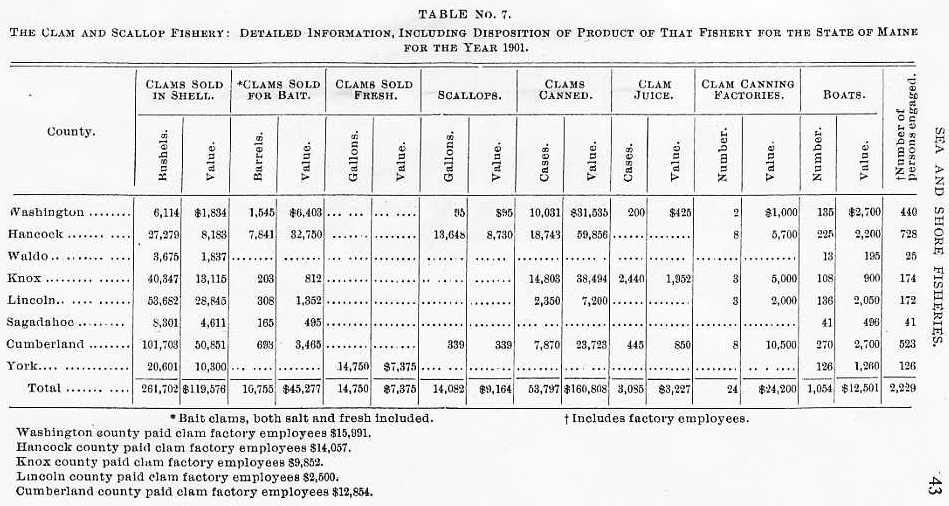
Bait clams, both salt and fresh included. Includes factory employees.
Washington county paid clam factory employees $15,991.
Hancock county paid clam factory employees $14,057.
Knox county paid clam factory employees $9,852.
Lincoln county paid clam factory employees $2,500:
Cumberland county paid clam factory employees $12,854.
-------------------------------------------------------------------------------------------------------------
44 Maine Sea and Shore Fisheries 1901-1902
TABLE 8 Clam and Scallop Fishery, detailed information including disposition of product of that fishery for the state of Maine for the year 1902
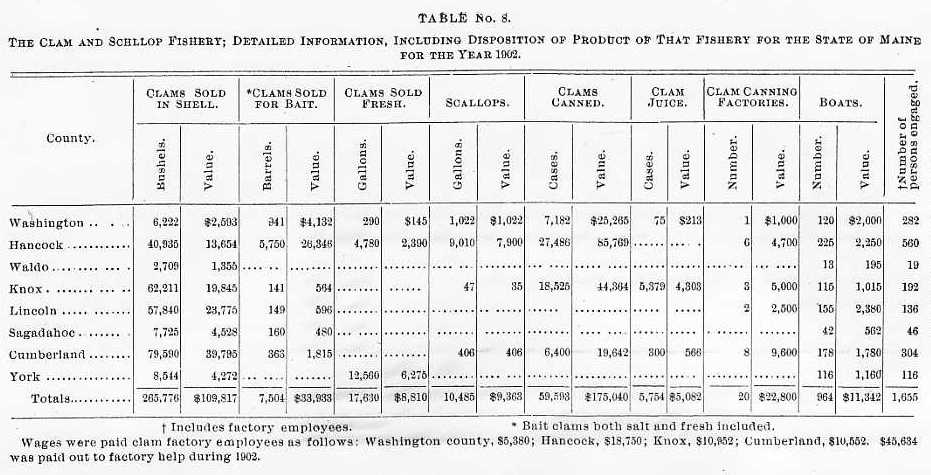
-------------------------------------------------------------------------------------------------------------
45 Maine Sea and Shore Fisheries 1901-1902
THE SMELT FISHERY.
This is a very considerable business in a very small fish. Many men are engaged therein, and large shipments are made out of the State to the decided advantage of the many transportation and express lines.
There are many amendments proposed to the present law, mostly of local application, which will probably be presented to the committee at the proper time and place for consideration. If any change is to be made I would suggest a uniform close time throughout the State so far as practicable.
Warden Hanna writes in his letter:
"The smelt law seems to meet the general approval of all classes of our citizens. This, like other fishing industries, has flourished, and the smelt fisheries net a large reward in the winter months to many of our fishermen, more so on our inland rivers, bays, and coves that freeze over in the winter than on the coast. There needs be a more rigid enforcement of the law in the spring or fall while the smelt is taking the brook for spawning purposes. People thinking they have a right to take a mess will often destroy a bushel in getting the mess. I would recommend an absolute close time from April 1 until October 30 during which time no smelts should be taken in any other way than by hook and line. This would drive the swarms of violators from our brooks in spawning time that go there for no other purpose than to destroy the spawning fish."
Warden George E. Cushman says :
"In regard to the smelt law I think a uniform law, a close time from the 1st day of April to the first day of September, would be more satisfactory to the fishermen than the present law."
Warden George W. Frisbee has this to say :
"The smelt fishermen say that they have got more smelts in November this year than they have got for the last ten years."
Warden George A. Dow of Portland puts it this way :
�I would suggest that the present law regarding smelts be so amended that smelts taken in any manner or caught in any county
-------------------------------------------------------------------------------------------------------------
46 Maine Sea and Shore Fisheries 1901-1902
in the State should not be sold or offered for sale or shipped from the State between April 1 and October 1. As the law now stands smelts can be taken in some counties between April 1 and May 1.
These are shipped to the Portland market and offered for sale. The present law prevents taking smelts in April unless they are dipped. I believe the adoption of this amendment would be of universal fairness to all the fishermen, and thus avoid the discrimination which seems now to exist in some counties."
Warden Isaac H. Snow of Brunswick tersely states it thus :
"I would have a close time for two years on smelts, except that I would allow to be taken the year round by hook and line. Four out of five of all smelts taken by net have to be thrown away, and I would have all pounds and traps taken from the water by September 1st. The mackerel come into the bays in the spring and the young grow to be five or six inches long the first season, and when they go out in the fall the pounds get most all of them, and a very large part of them taken only to be thrown away."
Warden Joseph Hamilton of Pembroke has this :
"The smelt fishing here is quite an industry, but not carefully looked after. There is a great waste of them during the ice-fishing with bag nets. The meshes of the bag nets are so small that nearly one-half of the smelts are left on the ice. Nets should have larger meshes so the small fish could get through."
Warden Ruel T. York of Damariscotta Mills writes:
"A law which shall better protect smelts in the spawning season is needed. In the months of April and May, when they go into the brooks to spawn, there is in many cases a wholesale destruction of these fish. I am informed that in these months cart loads of them have been taken from brooks which flow into the Damariscotta river and used for hen food and fertilizer."
-------------------------------------------------------------------------------------------------------------
47 Maine Sea and Shore Fisheries 1901-1902
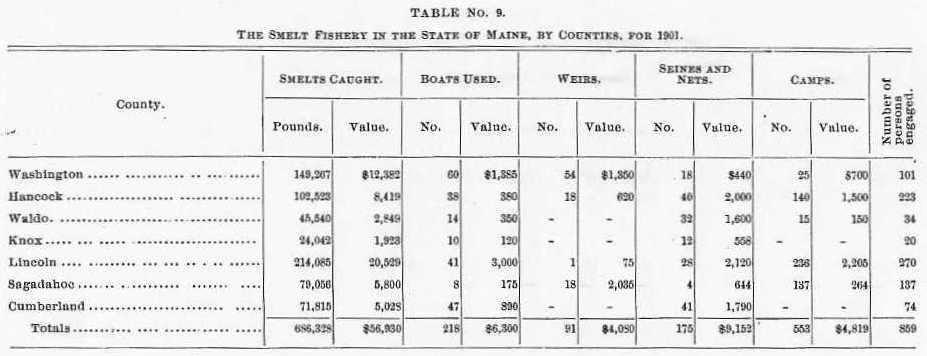
-------------------------------------------------------------------------------------------------------------
48 Maine Sea and Shore Fisheries 1901-1902
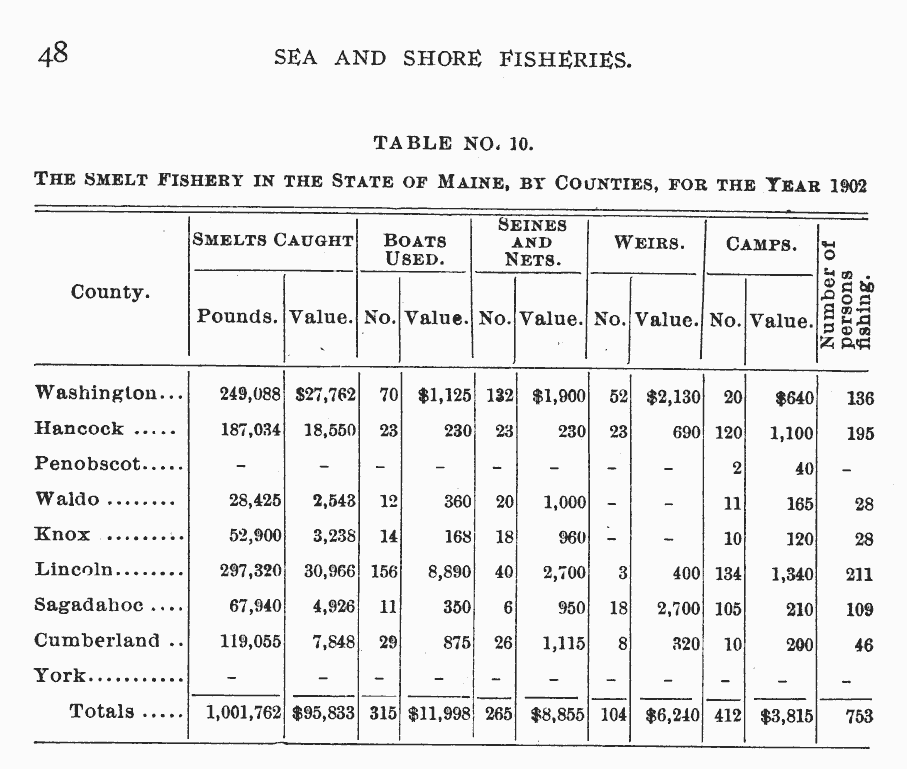
TABLE NO 10
The Smelt Fishery in the State of Maine, by Counties for the year 1902
-------------------------------------------------------------------------------------------------------------
49 Maine Sea and Shore Fisheries 1901-1902
ALEWIFE FISHERY
This fishery shows a very considerable decline in the production as compared with previous years. The great reduction in the catch is in Lincoln county where is located the largest privilege in the State.
I can account for this decline in but one way, and that is a lack of proper care on the part of the town authorities of New Castle and Nobleboro in the removal of filth and accumulation from sawmills located upon, or at the head of the stream upon which the fishery is located. For many years sawmill refuse has been gathering and has gradually filled the approaches to the fishery, leaving the water very shallow indeed, so that when a school of fish of any depth enter, it is almost impossible for them to swim, and they are so near the surface, that with the least movement or noise in the vicinity of the stream, the fish immediately return to deeper water in the bay below and there stay, and instead of getting up through the locks on to their natural spawning grounds in the Damariscotta lake, many of them cast their spawn in the brackish water of the bay, where it never matures.
I have suggested to those in authority the dredging of the channel and the basin below the falls, so as to obtain a good depth of water, and give the fish ample room to remain as long a time as they may require before starting on their journey to the spawning ground.
The town fish agents did attempt to dredge in 1902, but about that time the alewives appeared and at once the dredging was discontinued and never again resumed.
The foregoing is only my opinion, but if it is correct and nothing is done in the direction of dredging the channel it is a question of but a few years when the New Castle and Nobleboro fishery will be classed with those at East Machias, Columbia Falls, and Dennysville.
Tables are appended giving the statistics of the fishery, to which all are referred, and following I quote what is said by Warden S. P. Cousins of East Lamoine as to the fishery in other counties than Lincoln.
-------------------------------------------------------------------------------------------------------------
50 Maine Sea and Shore Fisheries 1901-1902
Warden Cousins states the difficulties in his locality in the following communication :
"EAST LAMOINE, October 14, 1902.
"Dear Sir : - I can think of no branch of the fisheries industry that is so poorly protected as the alewive fishery. In Orland the catch has decreased more than one-half in five years. In East Machias and Dennysville it is nearly, or quite as bad. In each locality I have seen the fishways. In East Machias the lower end of the fishway has no connection with the water, and in each of the others mentioned refuse from the mills obstruct the fish-ways and make them useless. In the town of Franklin, with a proper fishway that would cost but very little to build, there being no dams excepting such as hold a screen to prevent landlocked salmon going out of the pond (Donnell's), I think one of the best alewive privileges in the country would result - in a few years. In each of the localities mentioned the towns have the superintendence of the alewive privileges; also in each one I think the owners of the mills and dams on the alewive runs have made the town law inoperative.
"The remedy that suggests itself to me is to have every alewive privilege in Hancock county and Washington county subject to the sea and shore fisheries laws ; that fishways for the passage of alewives or salmon should be under the jurisdiction of the Commissioner of Sea and Shore Fisheries, and that his wardens should see that the fishways are kept free from obstructions while the fish are running.
"The reason I have for giving the Commissioner of Sea and Shore Fisheries supervision, is that there are no fish and game wardens near the above mentioned localities, where they would be needed in case the work of fishways, etc., is left in the hands of the fish and game commissioner. "Finally I do not know of any branch of the fishing business that is so poorly looked after, or one that better methods would give better results.
Yours respectfully,
S. P. COUSINS, (Warden).
-------------------------------------------------------------------------------------------------------------
51 Maine Sea and Shore Fisheries 1901-1902
"Warden Kane says as follows :
"I would like to see the alewive fishing put under the State law. The Dennys river fishing will be ruined if something is not done to protect it, as all the fish are dipped at the mouth of the fishway and it is impossible for the alewives to get above the dam."
The tables following show in detail the alewive fishery for the two years last past.
-------------------------------------------------------------------------------------------------------------
52 Maine Sea and Shore Fisheries 1901-1902
TABLE 11. Showing by Counties Statistics of the Alewife Fishery in the State of Maine for hte year 1901
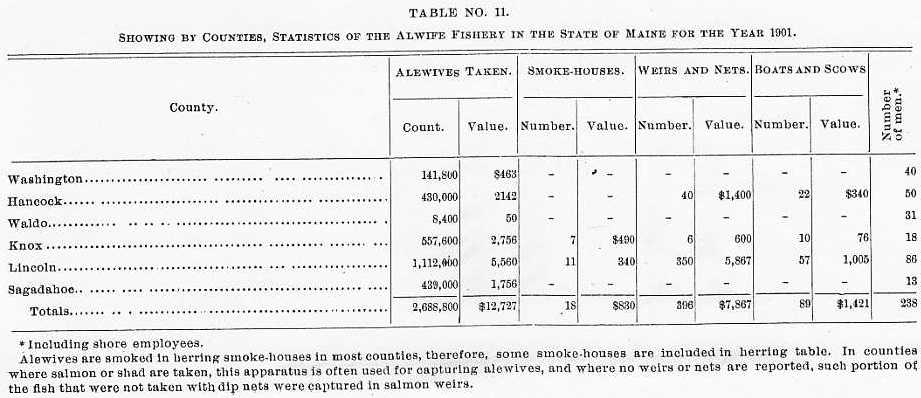
-------------------------------------------------------------------------------------------------------------
53 Maine Sea and Shore Fisheries 1901-1902
TABLE 12. Showing by Counties Statistics of the Alewife Fishery in the State of Maine for hte year 1902
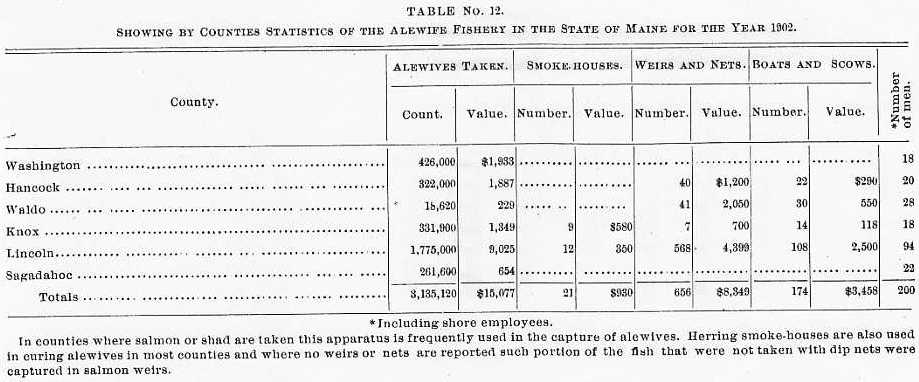
-------------------------------------------------------------------------------------------------------------
54 Maine Sea and Shore Fisheries 1901-1902
GROUND FISHERY.
This fishery will be materially affected by the Hay-Bond treaty with Newfoundland. If ratified it allows salt and dry codfish and cod oil into this country free, which will give Newfoundland the opportunity to send their prepared codfish all over our country, and with which we cannot successfully compete. It is well known that the United States cannot produce fish as cheaply as either Newfoundland or Nova Scotia, therefore it stands us in hand to look sharp to see that the above mentioned treaty is rejected.
I am still an earnest advocate for a bounty to be paid to our fishermen by the government, and I hope to see Senator Frye's subsidy bill pass, especially that part which provides for a bounty to be paid owners and crews of fishing vessels. If I were asked to make a suggestion as to this bounty I would say the amount proposed is not large enough.
Warden Benjamin F. Howard of Deer Isle reports :
"The present sea and shore fisheries' laws seem to be entirely satisfactory to those engaged in that industry in my district, and the only suggestion, or change, that I have heard is that a law should be passed prohibiting the taking of flounders by seines."
Tables numbered 13 and 14 show at a glance the production, value, etc., in this fishery in all the counties for the term covered by this report.
-------------------------------------------------------------------------------------------------------------
55 Maine Sea and Shore Fisheries 1901-1902
TABLE 13 Statistics of the Groundfishery in the State of Maine, by Counties, for the year 1901
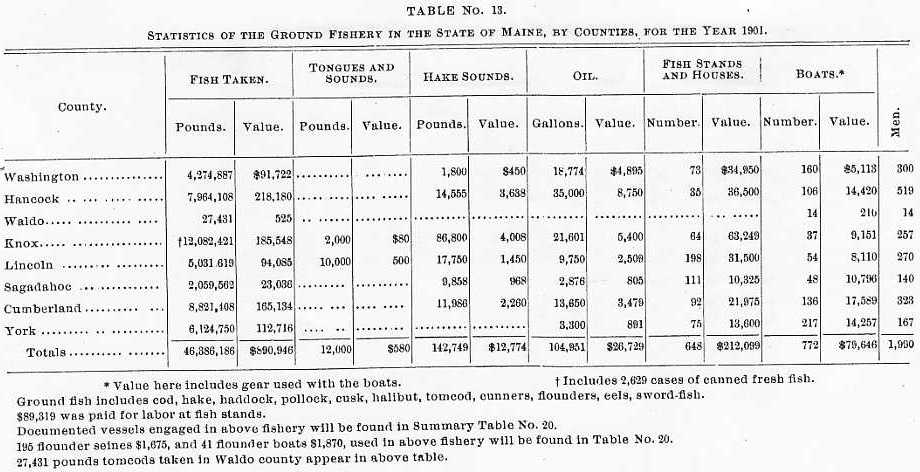
-------------------------------------------------------------------------------------------------------------
56 Maine Sea and Shore Fisheries 1901-1902
TABLE 14
Statistics of the Groundfishery, by Counties in the State of Maine for the Year 1902
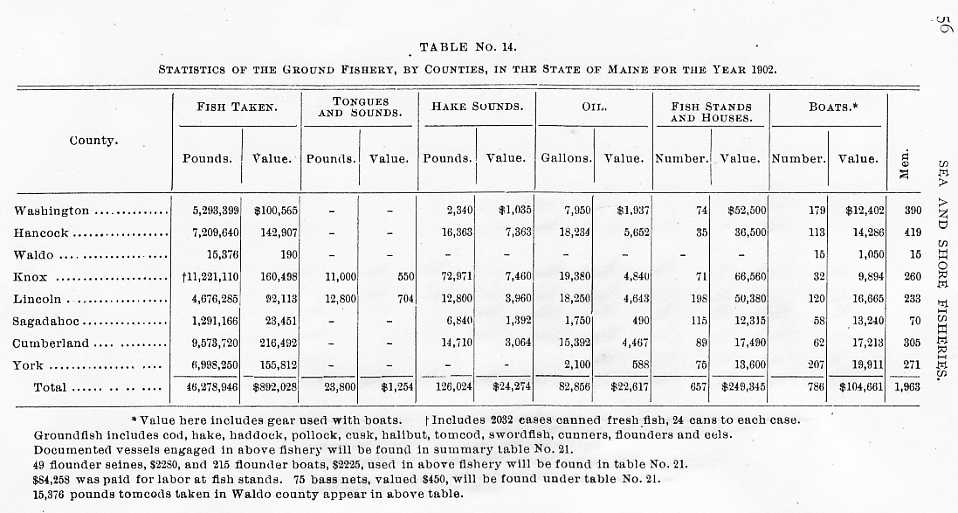
-------------------------------------------------------------------------------------------------------------
57 Maine Sea and Shore Fisheries 1901-1902
THE MACKEREL FISHERY.
In this important fishery I can say that for 1901 the business was much better than for 1902. In the year 1901, the first and middle part of the season, the fish were fairly plentiful in southern and Maine waters, but in the latter part of the season there was complete failure, and many skippers as well as owners of vessels were very much disappointed as they had entertained hopes of rounding out the year's work with large catches, as well as stock.
One gasoline auxiliary schooner was added to the Maine fleet this year.
The year 1902 was much the same as 1901. It started in with quantities of fish in the south and good indications of fish on our coast of Maine and in the Bay of Fundy, but the prevalence of fog and bad weather, just at the time when clear weather was necessary to sight the fish, retarded the movement of vessels, and when the fog cleared - which was after several weeks' duration - the weather became blustering and after a continual series of gales, the fishing was given up and the vessels withdrawn from that business to go into other pursuits where the owners anticipated better returns.
Captain Eben Lewis, of the new auxiliary schooner Natalie B. Nickerson of Boothbay Harbor, took the "high line" honors in the State in 1902 as well as in 1901. Many Maine skippers are in charge of auxiliary, as well as sailing vessels, from Gloucester and elsewhere, and are among the "high liners" from these localities.
Our fleet of mackerel vessels number but a few and show a very small increase since last report.
Full information is tabulated as follows: In table No. 15 showing for the two years, covered by this report.
-------------------------------------------------------------------------------------------------------------
Maine Sea and Shore Fisheries 1901-1902 58
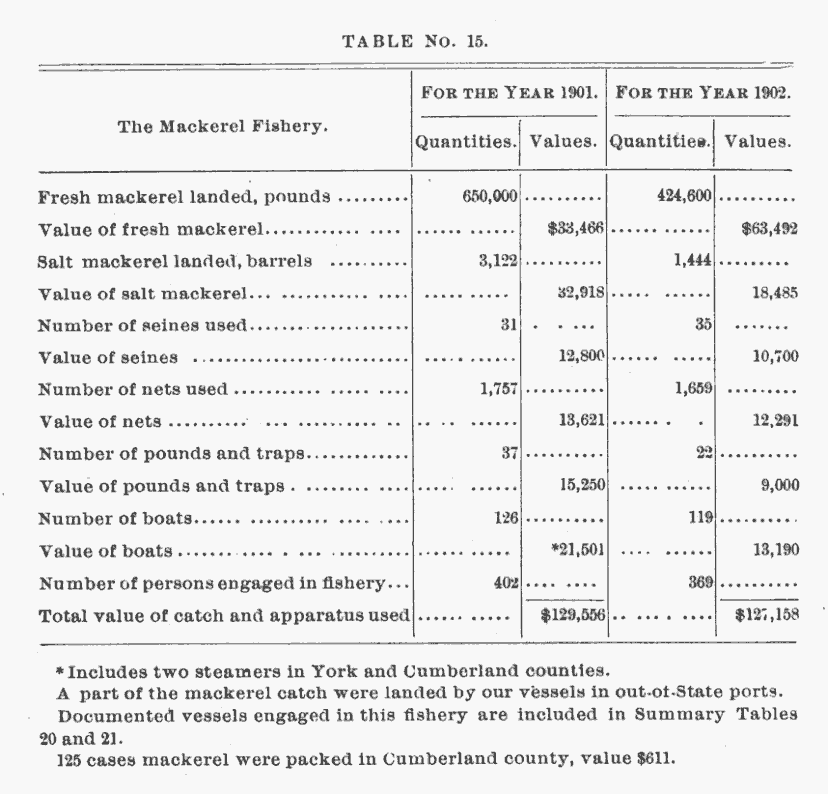
TABLE 15
Mackerel Fishery for the years 1901 and 1902 (Quantities and Values)
-------------------------------------------------------------------------------------------------------------
Maine Sea and Shore Fisheries 1901-1902 59
SHAD FISHERY.
One million and a half pounds of shad have been taken since my last report by Maine fishermen, and there has been considerable increase in the value - $13,500. One hundred sixteen more men have engaged in the business and there has been a material increase in the value of the apparatus employed. The gear and apparatus engaged has been $95 per man in this business. The catch 2,298 pounds per man.
Tables combining the information for both years - 1901 and 1902 - are added for easy reference.
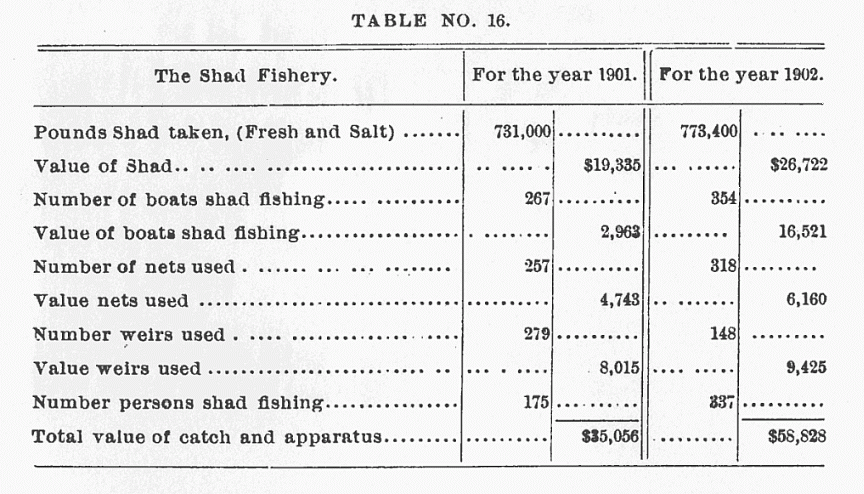
TABLE NO. 16.
The Shad Fishery. For 1901. For 1902.
Pounds Shad taken, (Fresh and Salt) 781,000 773,400 .
Value of Shad $19,335 $26,722
Number of boats shad fishing 267 354
Value of boats shad fishing $2,963 $16,521
Number of nets used . 257 318
Value nets used $4,743 $6,160
Number weirs used. 279 148
Value weirs used $8,015 $9,425
Number persons shad fishing 175 337
Total value of catch and apparatus $35,056 58,828
-------------------------------------------------------------------------------------------------------------
60 Maine Sea and Shore Fisheries 1901-1902
SALMON FISHERY.
There has been an increased catch of salmon for the period of this report as compared with previous report of 37,599 pounds. The increase in value of catch is $30,097.
It is believed that the catch in the Penobscot and St. Croix rivers, at least, can be increased materially. This department will neglect no measures or effort which will insure better results at these points, as well as elsewhere, in connection with the salmon fishery.
Warden William Hale of Bangor, as to the salmon fishery in his district, writes : "I will say that there should be a good liberal appropriation for the protection of the salmon because after close time I understand that quite a number are killed up in the head waters of the Penobscot by the use of dynamite cartridges, and the same are shipped out of the State to the various hotels at the summer resorts.
Now where I am stationed at the dam in Bangor I find it necessary to keep my man with me all the summer to prevent poaching, so I think the more protection the more fish you will have. I also think that if there was one day a week close time on the weirs that the fish would have a better chance to reach their spawning grounds in large numbers."
Warden Frisbee reports conditions satisfactory in his territory. He says : "The fishermen in this county are satisfied with the law as far as I know. The salmon fishermen think the hatchery has done good work. They have gotten good many small salmon the last two years and think that is the cause of it."
Warden Albert French of Calais says :
"We must do something to protect the salmon in the St. Croix river. The present methods of fishing kill the salmon and ought to be stopped. I would advise the 'weirs on the river be closed 48 hours from Saturday morning until Monday morning same as the set nets, that (would be) giving both equal rights, and the 500 feet above the ferry point bridge struck out."
-------------------------------------------------------------------------------------------------------------
61 Maine Sea and Shore Fisheries 1901-1902
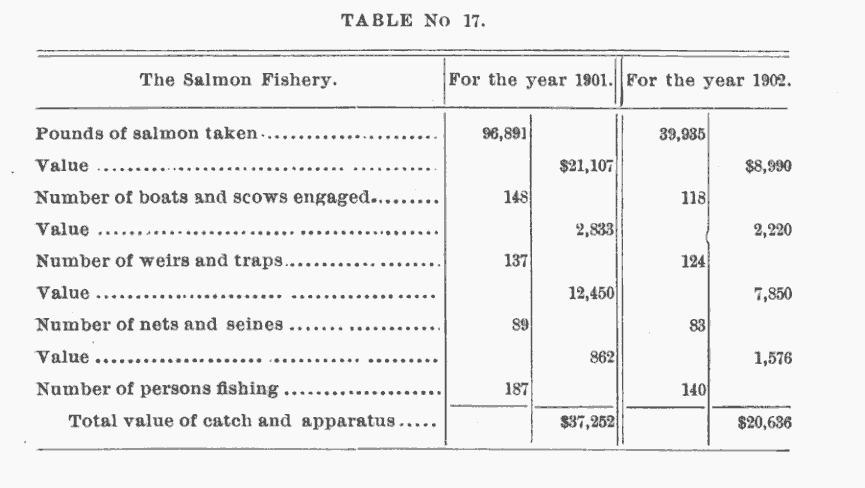
TABLE 17
Salmon Fishery Statistics for 1901 and 1902
------------------------------------------------------------------------------------------------------------- P>
62 Maine Sea and Shore Fisheries 1901-1902 <
WARDENS AND THEIR WORK.
These officers have, I believe, attended to their duties during the last two years and shown more interest in their work than I have ever known them before.
The result of their work shows that they must have spent a large portion of their time in watching and bringing to justice guilty parties for in that time 547 persons, (who have in one way or another violated our fish laws), have paid to our State treasurer, fines to the amount of $3,166.95, and have seized 67,608 illegal lobsters.
They have furnished to this department valuable statistical information, without which it would be impossible to give the statistics contained in this report as to the value and importance of Maine's fisheries.
-------------------------------------------------------------------------------------------------------------
63 Maine Sea and Shore Fisheries 1901-1902
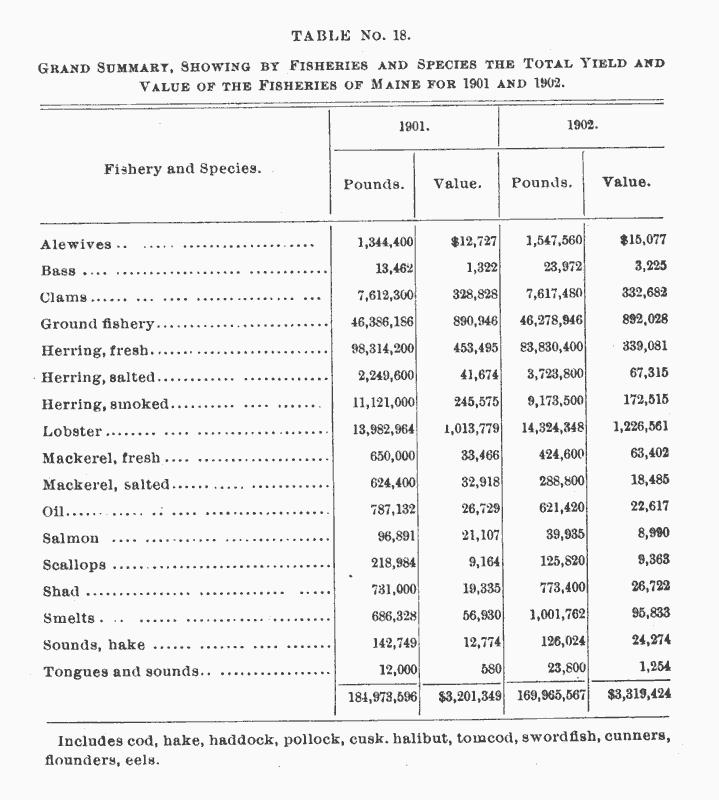
TABLE 18
Grand Summary, Showing by Fisheries and Species the Total Yield and Value of the Fisheries of Maine for 1901 and 1902
-------------------------------------------------------------------------------------------------------------
64 Maine Sea and Shore Fisheries 1901-1902
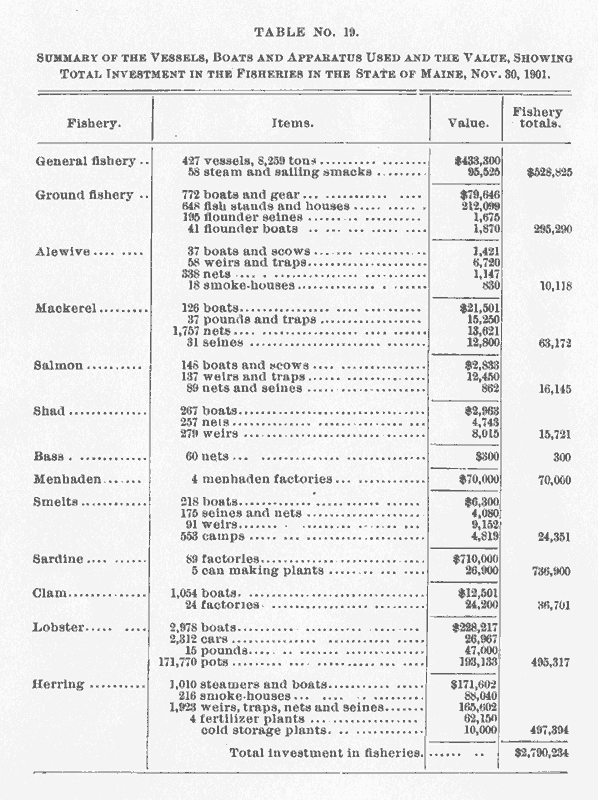
TABLE 19
Summary of the Vessels, Boats and Apparatus Used and the Value Showing total Investment in the Fisheries of the State of Maine November 30, 1901
-------------------------------------------------------------------------------------------------------------
65 Maine Sea and Shore Fisheries 1901-1902
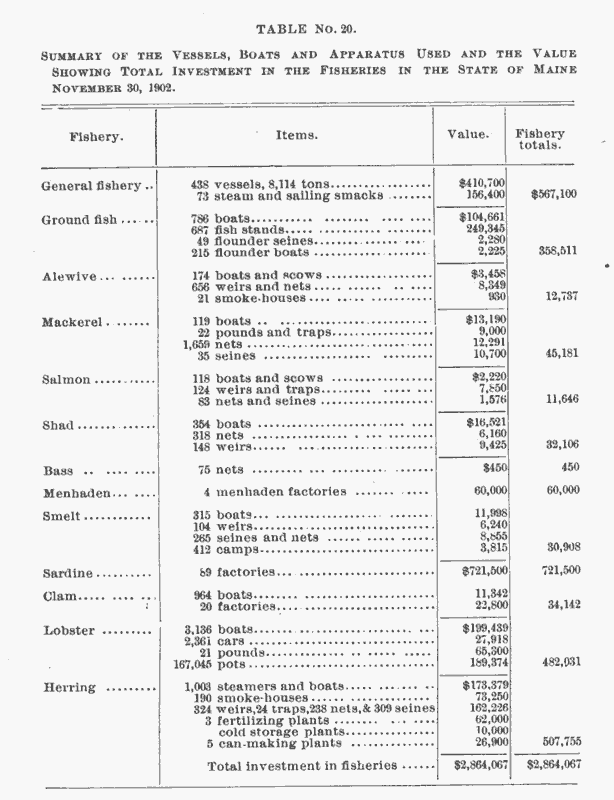
TABLE 20
Summary of the Vessels, Boats and Apparatus Used and the Value Showing total Investment in the Fisheries of the State of Maine November 30, 1902
-------------------------------------------------------------------------------------------------------------
66 Maine Sea and Shore Fisheries 1901-1902
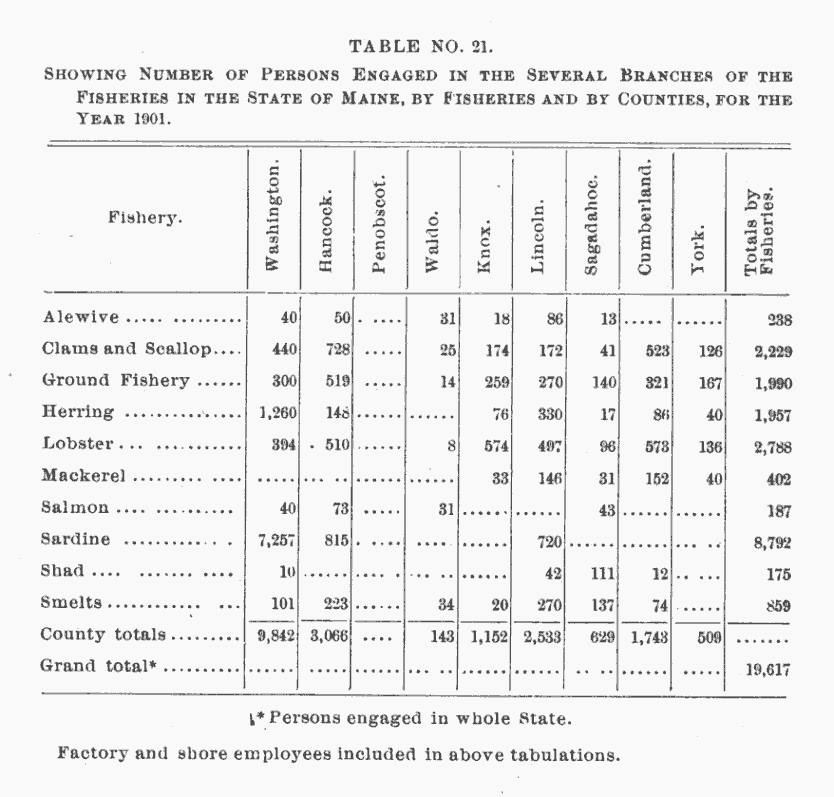
TABLE 21 Showing number of people engaged in the various fisheries in the state of Maine, by Fisheries and by Counties, for the year 1901
-------------------------------------------------------------------------------------------------------------
67 Maine Sea and Shore Fisheries 1901-1902
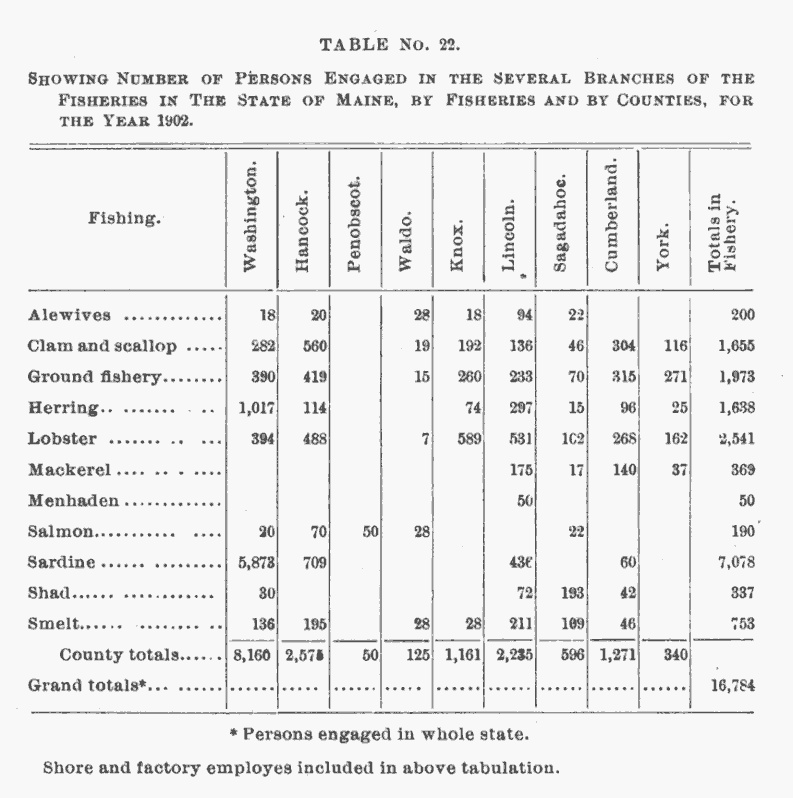
TABLE 22 Showing number of persons engaged in the various fisheries in the state of Maine, by Fisheries and by Counties, for the year 1902
-------------------------------------------------------------------------------------------------------------
68 Maine Sea and Shore Fisheries 1901-1902
List of Fish Wardens Now in Commission.
YORK.
J. F. Goldthwaite. Biddeford.
CUMBERLAND.
George A. Dow. Portland.
Richard Orr. Orr's Island.
SAGADAHOC.
A. C. Johnson. Ashdale.
LINCOLN.
R. T. York. Damariscotta Mills.
N. J. Hanna. New Harbor.
C. E. Sherman. Bootbbay Harbor.
KNOX.
W. L. Blackington. Rockland.
WALDO.
George W. Frisbee. Belfast.
HANCOCK.
S. P. Cousins. East Lamoine.
F. L. Hodgkins. Lamoine.
F. M. Trundy. Oceanville.
B. F. Howard. Deer Isle.
WASHINGTON.
W. A. Henderson. Cutler.
P. M. Kane. Eastport.
W. W. Blood. Milbridge.
D. O. French. Jonesport.
Deputy Fish Wardens now in Commission.
George E. Cushman. Cape Elizabeth.
I. H. Snow. Brunswick.
L. S. Nickerson. Boothbay Harbor.
William Hale. Bangor.
Albert French. Calais.
Sardine Wardens now in Commission.
Henry D. Avery. North Lubec.
Alfred Small. Lubec.
Joseph Hamilton. Pembroke.
S. P. Cousins. East Lamoine.
W. A. Henderson. Cutler.
W. J. Fisher. Eastport.
J. H. McDiarmid. Eastport.
John E. Kelley. Boothbay.
F. M. Trundy. Oceanville.
W. W. Blood. Milbridge.
-------------------------------------------------------------------------------------------------------------
69 Maine Sea and Shore Fisheries 1901-1902
LIST OF INSPECTORS OF PICKLED FISH.
Name__Residence__Date of Commission __
Charles B. Meserve__Bristol __September 20, 1898
F. J. Dugo__Steuben__September 20, 1898
Joseph W. Sheppherd__ Portland__ October 25, 1898
Joseph W. Lord__ Portland__ August 23, 1893
Samuel F. Bearce__Portland__August 22, 1901
Charles A. Dyer__ Portland __June 15, 1900
Falmer Lakeman__ Jonesport __ July 13, 1899
Gilman N. Williams__ Cutler__ September 7, 1900
William B. Holmes__ Eastport__ August 23,1899
Joseph Farris__ Eastport__ August 23, 1899
E. W. Holmes__ Eastport__ September 25, 1899
Eben A. Holmes__ Eastport__ October 18, 1899
Robert Spear__ Eastport __ September 25, 1899
Abner Leonard__ Eastport __ September 25, 1899
Hiram Blanchard__ Eastport __ September 25, 1899
S. W. Leonard__ Eastport __September 25, 1899
J. E. Wickerson__ Eastport__ August 21,1902
B. M. Pike__ Lubec __ September 25, 1899
Jacob Pike__ Lubec __September 25, 1899
James J. McCurdy__ Lubec __September 25, 1899
George A. Mowry__ Lubec __September 25, 1899
Elias P. Lawrence__ Lubec __October 8, 1900
Everett Reynolds__ Lubec __September 25, 1899
John E. Crie__ Criehaven Plantation __ November 13, 1899
Charles E. Mills__ North Haven __ December 13, 1899
C. E. Weeks__ Rockland __February 28, 1900
Thomas M. Nicholson__ Bucksport __July 20,1900
William Brennan__ St. George __October 8, 1900
Nathan B. Dyer__ Milbridge __October 8, 1900
S. J. Roberts__ Milbridge __ June 26, 1899
Clinton M. Hamilton__ Chebeague __October 29, 1902
Arthur E. Nickerson__ Boothbay Harbor__ July 22, 1902
A. M. Powers__ Boothbay Harbor __ October 18, 1902
Andrew R. Holmes__ Perry __ November 1, 1901
M. J. Powers__ Pittston __ November 25, 1901
The above are commissioned for five years.
-------------------------------------------------------------------------------
END
.
.
.
.
.
.
.
.
.
.
.
.
.
.
.
.
.
This report was copied from an original edition at the Bangor Public Library, then digitized and uploaded to the internet by Ron Huber, Penobscot Baywatch, Rockland, Maine, 11/28/07. Please contact him to point out errata, or for more information or with your inquiries.